




By Ebony JJ Curry SENIOR REPORTER
By Samuel Robinson SENIOR REPORTER
Detroit City Clerk Janice Winfrey is hosting the “Block Party for Democracy” Saturday to mark the opening of Detroit’s early voting centers for the August primary election.
By Ebony JJ Curry
SENIOR REPORTER
Late Thursday night, Sept. 14, a historic moment unfolded in American labor relations as the United Auto Workers (UAW) union initiated a strike against Ford, General Motors (GM), and Stellantis. For the first time, the union took simultaneous action against all three major Detroit-based automakers. The action involves approximately 13,000 UAW members in assembly plants across Michigan, Ohio, and Missouri, who walked off their jobs after existing labor contracts expired at 11:59 p.m.
Early voting centers are open Saturday, July 26 through Sunday, Aug. 3, from 9 a.m. – 5 p.m. After the primary, the voting centers will reopen for the Nov. 4 general election on Saturday, Oct. 25 through Sunday, Nov. 2, from 9 a.m. – 5 p.m.
IDJs, food trucks and family friendly activities can be found at the event in between Second and Third at 2978 W. Grand Blvd. on Saturday, July 26 from 9 a.m. – 5 p.m. There are also plans for adoptable dogs from the Michigan Humane Society.
n a breathtaking celebration of talent, determination, and the unyielding spirit of Black excellence, the Michigan Chronicle marked its 10th Annual 40 Under 40 event Thursday evening. This year’s soirée, drenched in the theme “All Black Everything with Gold Accents,” transcended expectations and essentially illuminated the golden gems within the true essence of Black excellence. Hosted by the charismatic duo of Andre Ash and Lynzee Mychael from Michigan Chronicle’s Finally Friday, the night was a triumph for the city of Detroit and its vibrant community of young Black pro-
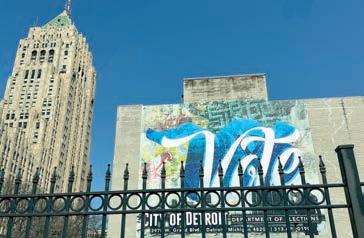
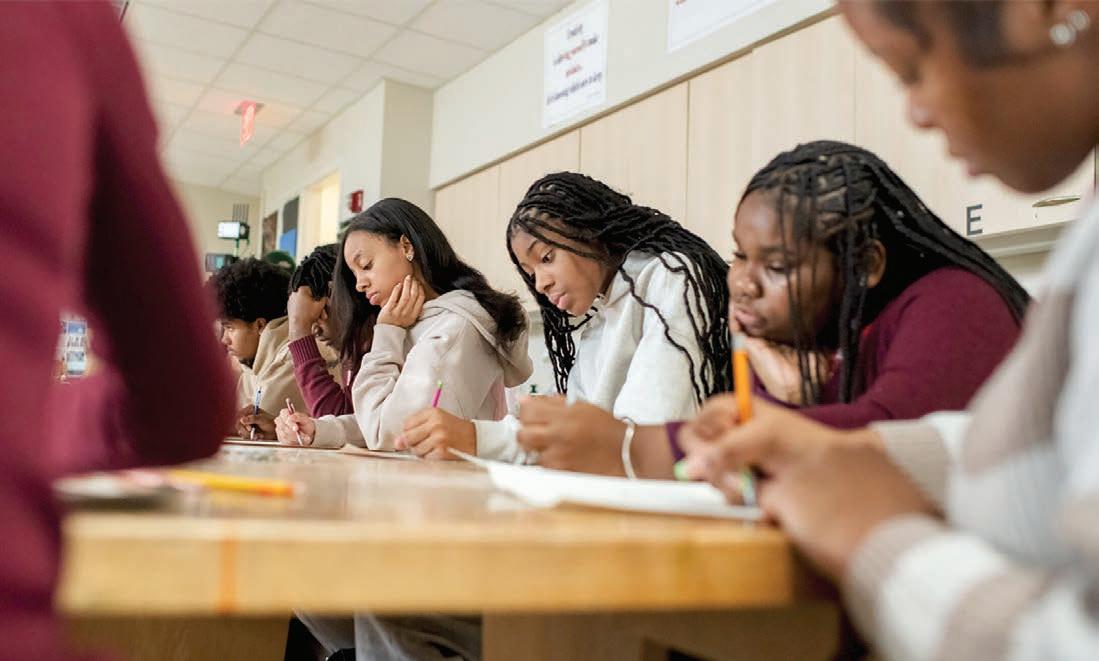
own path to success. Clement “Fame” Brown, the creative mind behind Three Thirteen Detroit’s Brand Name, received the prestigious Entrepreneur of the Year Award. Brown’s commitment to empowering the city through fashion and entrepreneurship has left an indelible mark.
The evening sparkled with a golden promise as we celebrated remarkable individuals from various walks of life. Among the honorees were the brilliant and visionary co-founders of Detroit Hives, Nicole Lindsey and Timothy Paul Jackson. Their work has not only changed the landscape of beekeeping and urban farming in Detroit but also exemplified the transformative impact Black professionals can have on their communities.
Shortly before midnight on Sept. 14, GM released a statement expressing disappointment with the strike action, despite offering what it termed an “unprecedented economic package” that included historic wage increases. Stellantis also expressed disappointment in a statement, saying the company immediately went into contingency mode to protect its operations.
By Ebony JJ Curry SENIOR REPORTER
“Entrepreneur of the year – that’s a big deal,” said Brown. “It’s always an honor to be honored and it’s always a blessing to be in a room full of so many talented, accomplished, and popular people that look like me. I’m geeked. I started making and selling clothes as a kid and I always knew that I would have a business, but I never knew it would be Detroit’s brand name business, so I take a lot of pride in the fact that our business represents our city’s pride.”
Greektown Had 1.4 Million
ry curriculum, novel selections at each grade level through our English and Language Arts courses, and supplemental social studies content.”
By Ebony JJ Curry SENIOR REPORTER
“We’re excited about this block party and the launch of our Early Vote Centers,” Winfrey said. “It’s an opportunity to celebrate civic pride, enjoy the vibrant spirit of summer in Detroit, and most importantly — ensure voters knows their voice matters when it comes to shaping the leadership and future of our city.”
“Together we have created a social, environmental, and financial impact through bees,” said Jackson. Lindsey followed that sentiment with, “It is through our local partnerships and collaborative efforts that we exist in over 28 plus locations managing the health of 4.5 million honeybees – humbly speaking our movement has inspired others locally, nationally, and even internationally to take on similar missions.”
Early voting is available on site.
In a city where Black culture shapes the rhythm of daily life, the Detroit Public Schools Community District is confronting an outdated educational system that still centers whiteness in its core curriculum. Despite serving a student population that is 82% Black, Detroit’s K–12 standards have historically reflected a Eurocentric worldview by limiting Black history to mostly slavery and civil rights.
Taking home the Corporate Excellence Award was Dannis Mitchell, Director of Community Engagement at Barton Malow.
Dr. Vitti explained that the district doesn’t just drop materials in classrooms without critical review.
DPD Chief James White Says Increased Police Presence Culled Violence By Andre Ash
ness district that had been the lifeblood of the community.
DIGITAL ANCHOR
Manual resource, which teaches how local government works and how students can take civic action,” Campbell-Williams added. “Black history is no longer limited to one unit or one month. It is woven throughout all grades, so students see their identities and contributions as central to understanding the world.”
For many Detroiters, Interstate 375, or I-375, has long been just another stretch of urban highway, a concrete artery connecting different parts of the city. To some, it’s a mere convenience; to others, it’s an unremarkable part of their daily commute. However, there’s a deeper, far more troubling story beneath the surface of this seemingly ordinary freeway—a story of pain, displacement, and the lasting impact on Black Detroiters.
Early voting makes it easier for residents to vote on their schedule. At one of the many locations, you can register to vote or drop off your absentee ballot. For more information on early voting locations and times, visit detroitmi.gov/elections.
But inside of DPSCD, a deliberate effort is underway to change that. From a homegrown Detroit History curriculum to inclusive literature and civic engagement tools, the district is working to rewrite what relevance and representation look like in education.
Detroit Hives, a pioneering organization founded by Lindsey and Jackson, harnesses the power of urban beekeeping to revitalize neighborhoods in the Motor City. Their initiative not only addresses critical issues like environmental conservation but also provides valuable education and employment opportunities to Black De-
The UAW has branded the industrial action as the “Stand-Up Strike,” focusing on specific plants within each automaker. UAW President Shawn Fain stated, “This strategy will keep the companies guessing. It will give our national negotiators maximum leverage and flexibility in bargaining. And if we need to go all out, we will. Everything is on the table.” Union leaders have also indicated that additional plants could be targeted in future waves if negotiations remain stalled.
“It is so important to recognize that there are young leaders across the country, many that are born here in Detroit. I represent our city nationally and I tell people, ‘Yea I’m a D-girl I’m from the west-side of Detroit,’” Mitchell expressed. “But more importantly, I’ve been able to have experiences within an industry that not many of us, specifically women of color, have the opportunity to engage in and I’ve been the youngest person in the room, the only Black person in the room, and the only Sistah in the room, and I really had to articulate the importance of showing up, giving chances when others won’t, and being persistent.” As a trailblazing Black woman thriving in a predominantly male-dominated industry, her unwavering commitment to fortifying the connections between businesses and Detroit’s communities is unde-
It’s a history marred by pain, injustice, and economic devastation. More than 130,000 residents, primarily Black, were forcibly displaced. Families were uprooted, generational wealth was obliterated, and a thriving community was torn asunder. The wounds inflicted by I-375 run deep, transcending the physical barrier of a freeway to penetrate the very soul of Black Detroiters.
“We actively review our teaching materials for explicit and implicit biases with internal and external stakeholders. We also invite all community members to review our curriculum materials for feedback and suggestions. When reviewed, we believe most people will see we are exposing our students to themes, content, and materials that reflect our students and their history.”
towards mending the wounds inflicted on Black Detroiters and restoring a sense of belonging that was so callously torn away in the past.
A string of shootings in Greektown in mid-April left both visitors and residents of this bustling downtown destination in awe. One of these shootings tragically claimed the life of a popular and beloved security guard following a dispute with a patron.
The I-375 Boulevard Project is about more than just correcting historical injustices; it’s about redefining the future. It will connect downtown Detroit to surrounding neighborhoods, bridging the gap that was placed upon the city decades ago.
You can vote with an absentee ballot at the Detroit City Clerk’s office located at 2 Woodward Ave #200 Detroit, starting 40 days before Election Day until 4pm the Monday before Election Day.
A 2023 Education Trust study confirms that only 13% of the mandated K-12 curricula includes meaningful Black historical content outside of slavery and civil rights.
This painful legacy can be traced back to the nation’s interstate highway program of 1956—a program that aimed to connect the country but often did so at the expense of marginalized communities. In the case of I-375, it meant carving a path through the heart of Black Detroit, reinforcing segregation, and perpetuating inequality.
For Leenet Campbell-Williams, the district’s Chief Academic Officer and head of social studies, this work is both personal and professional. She’s a DPSCD graduate herself.
That weaving isn’t theoretical. It lives inside the pages of books. The district’s Detroit Perspectives Project revises and supplements core literacy materials to center stories of Black resistance, resilience, beauty, and brilliance. It includes texts like March: Book One, Kindred, Hidden Figures, and One Last Word— books that frame Black life with power, not pity.
The male suspect allegedly shot the guard before fleeing the scene, while his female companion is accused of concealing the weapon in her bra.
By Andre Ash DIGITAL ANCHOR
For the August 5 Primary Election, voters have been voting early in person with an absentee ballot at the Detroit City Clerk’s office since June 26. If you are registered to vote at your current address, you can vote at the Clerk’s office until August 4 at 4 p.m.
The tale begins in what is now Lafayette Park, once known as Black Bottom—a neighborhood rooted in African-American culture and history. Named after its dark, fertile soil, Black Bottom flourished during the mid1900s, nurturing the dreams and aspirations of prominent Detroiters like Coleman Young, Joe Louis, and numerous other Detroit legends. But in the name of urban renewal in the 1950s, this vibrant neighborhood was systematically dismantled, erased from the map, and replaced by a lifeless stretch of asphalt.
That statistic doesn’t just tell a story—it demands a response.
“Recognizing that Detroit is a majority-Black city, we are committed to ensuring our students see themselves fully and affirmatively reflected in what they read and learn,” she said.
These incidents unfolded during an unseasonably warm spring, leading to increased pedestrian traffic and heightened tensions in the densely populated downtown area.
For one to aptly recognize the harm caused by such projects, it is vital to note that some of the planners and politicians behind those projects built them directly through the heart of vibrant, populated communities—oftentimes to reinforce segregation and sometimes as part of a direct effort to replace or eliminate Black neighborhoods.
Today, the resurgence of Paradise Valley stands as a testament to the indomitable spirit of Black Detroiters and the enduring legacy of Black excellence. This historic district, once a vibrant hub for Black businesses and culture, is experiencing a renaissance that harkens back to its glory days. The destruction of Black Bottom may have torn apart a thriving community, but the resolute determination of a new generation of entrepreneurs and visionaries is reclaiming that lost legacy.
Campbell-Williams said the effort is about creating students who not only read but also see. “We believe students thrive when curriculum nurtures their identity, builds academic confidence, and develops critical consciousness. Our approach is grounded in student-centered learning—ensuring every child is seen, challenged, and inspired.”
A Holistic Approach to Providing Shelter and Support for Detroit’s Unhoused People
Fain clarified the union’s strategy: “I want to give a major shoutout to the thousands of members who are on the picket lines right now fighting for all of us. The Stand-Up Strike is a new approach to striking. Instead of striking all plants at once, select locals will be called on to stand up and walk out on strike. This is our generation’s answer to the movement that built our union – the sit-down strikes of 1937. We told the Big 3 that Sept. 14 was the deadline and we meant it. We gave the companies our economic demands eight weeks ago and it took more than a month to get to the table.”
That commitment has reshaped how curriculum is written and taught.
The surge in crime and the influx of visitors to Detroit’s downtown core garnered the attention of the Detroit Police Department (DPD), catching them somewhat off guard.
For the Nov. 4 General Election, you can vote early in person with an absentee ballot at the Detroit City Clerk’s office starting on Sept. 25. Registered voters can vote at the Clerk’s office until Nov. 3 at 4 p.m.
While the residential areas bore the brunt of this demolition, the heart of Black Bottom, its thriving business center, remained largely untouched. Restaurants, theaters, clubs, and bars—the very places that brought Detroit’s Black community together—were concentrated around Hastings Street, the epicenter of African-American culture in the city.
Inside the Detroit Public Schools Community District, the fight to reclaim cultural truth in the classroom is ongoing and deliberate. Superintendent Dr. Nikolai Vitti says the district has taken intentional steps to confront historical erasure and build a curriculum that reflects the full humanity of Black students.
Housing Resource Helpline in response to the challenges that residents face in navigating the complex system of housing services. The helpline provides a single point of contact for people seeking housing assistance and connects them with the resources they need.
“We redesigned our ELA and social studies curriculum to be both rooted and relevant. Rooted means it is anchored in rigorous standards. Relevant means it connects to the lived experiences of our students and their communities,” said Campbell-Williams.
But now, after decades of enduring the scars of I-375, there is a glimmer of hope on the horizon. Plans have been unveiled to transform this once-divisive freeway into a vision that seeks to right the wrongs of the past while heralding a new era of inclusivity and community revitalization.
The union is pushing for a comprehensive list of demands. This
Homelessness continues to plague urban communities, with families and individuals grappling with the challenges of making ends meet in today’s economic climate. Whether it’s struggling to meet monthly mortgage payments or coping with soaring rental costs in a housing market marked by shockingly high prices, a variety of factors contribute to the growing issue of people becoming unhoused.
You can vote in person at a Detroit Early Voting Site. When you vote at an Early Voting Site, your voting experience will be similar to that of voting at a polling place on Election Day. You will complete your ballot, place it in a secrecy sleeve, and then deposit it into the voting tabulator.
Meagan DunnJulie Schneider
You can reach Sam at srobinson@michronicle.com.
Then, in a cruel twist of fate, Hastings Street, too, was obliterated a few years later, making way for the construction of I-375. This marked the final blow, sealing the fate of Black Bottom and signaling the beginning of the end for Paradise Valley, the Black busi-
“Black history is American history and should be a part of every school district’s curriculum beyond slavery and the civil rights movement, regardless of the race and/or ethnicity of students,” he told Michigan Chronicle. “In DPSCD we have been intentional to go far beyond slavery and civil rights content through the development and implementation of our elementary grades Detroit Histo-
Historically, shelters have provided a temporary respite for those in need, often serving as the first or second option after exhausting alternatives like staying with friends or family. Shelters offer a place to rest one’s head and a warm meal, albeit sometimes for extended periods. For others, being unhoused means living in cars or makeshift outdoor
Support for the helpline comes from the Gilbert Family Foundation, which has pledged $10 million over three years to fund the program. Wayne Metro Community Action Agency manages the helpline, making it accessible to all Detroit residents. This initiative simplifies access to the City’s various housing services, ensuring that residents in need can easily find assistance.
That reimagining led to the creation of the Detroit History curriculum, which explores labor movements, the Great Migration, music traditions like Motown and techno, and the lives of local leaders including General Gordon Baker Jr. and Grace Lee Boggs.
Fueled by more than $100 million from the Infrastructure Investment and Jobs Act and other partners, this ambitious project aims to create jobs, remove barriers to economic growth, and reconnect the neighborhood with the rest of Detroit. It is a step
“We paired this with the Citizen

What a Federal Government Shutdown Could Mean for Detroiters?
By Sam Robinson SENIOR REPORTER
By Lynzee Mychael MULTIMEDIA JOURNALIST
The causes of homelessness are as diverse and complex as the individuals experiencing it. In response, the City of Detroit has adopted a holistic approach to combat this issue.
“Providing services and high-quality housing to persons at risk of or who are experiencing homelessness is a key priority of the City of Detroit, said Julie Schneider, Director of Detroit’s Housing and Revitalization Department.
“This means focusing on building the pipeline of supportive housing and coordinating with the Continuum of Care on the delivery of critical resources such as emergency shelter, rapid rehousing, and diversion and prevention programs. It also means preserving and expanding affordable housing options for Detroiters of all incomes and improving housing stability though comprehensive service offerings available through the Detroit Housing Resource HelpLine and Detroit Housing Services Division within HRD.”

“The city and its partners offer a lot of great services to help Detroiters with their housing needs, but they don’t mean much if people don’t know how to access them,” said Mayor Mike Duggan. “Thanks to the efforts of our partners and the generous support of the Gilbert Family Foundation, we now have a simple process to guide residents to the right housing resource and a growing number of programs to help them.”
Residents in Southwest Detroit invited mayoral candidates to a community forum where their issues, like how the city treats small businesses, environmental and infrastructural concerns, plus immigration enforcement.
The Gilbert Family Foundation’s broader commitment involves pledging $500 million to support projects across Detroit over the next ten years, with housing initiatives being a significant part of their contribution.
The discussion, held Saturday, July 19, inside the Hispanic Community Development Corporation building at 1211 Trumbull, brought out around a hundred mostly undecided voters.
In May 2023, the City of Detroit launched the Detroit
From the days of the Great Migration when thousands of Black families flocked to Detroit in search of jobs and a better life, to the pivotal role they played in the city’s cultural and musical heritage, Black Detroiters have left an indelible mark on the city. However, in recent years, Detroit has experienced significant gentrification, which has raised concerns about the displacement of long-standing Black residents. Similar to a setting sun, there’s a rising spirit, and Black Detroiters are reclaiming their place in the city, despite the challenges posed by gentrification.
Notably, Detroit has witnessed a consistent decrease in recent years, with the number of unhoused residents steadi ly declining. In 2019, approximately 7,847 people were unhoused and entered the City’s community response system. In 2021, about 5,687 people experienced homelessness.
Former police chief James Craig, activist DaNetta Simpson and Triumph Church pastor Rev. Solomon Kinloch Jr. were the only candidates out of the nine-person field to not attend.
James White, Chief of Police for the Detroit Police Department, said: “We were caught somewhat flat-footed right out the gate. By design we went into the spring deployment, which is less than the mid-summer deployment, and saw we say an uptick in violence that first warm weekend.”
That work is especially urgent as national pressure mounts to strip curriculum of diversity. With political campaigns calling for the end of race-conscious education, and federal funding increasingly tied to compliance with those directives, districts like Detroit walk a tightrope. Still, Campbell-Williams says the district doesn’t bend to that pressure.
Chief White attributes the violence in Greektown to a combination of weather conditions and a surge in population.
“Our responsibility is to prepare students for college, careers, and life. That means meeting high academic standards while reflecting the stories of our community. National conversations about curriculum do not change our focus: strong content aligned to standards and connected to where our students live.”
In the heart of Paradise Valley, Blackowned businesses are not just flourishing but thriving, offering diverse services, products, and experiences that pay homage to the past while paving the way for a prosperous future. From jazz clubs to soul food restaurants, the Black Press, and art galleries to fashion boutiques, this revival is breathing life into the very essence of what once made this neighborhood a vibrant cultural epicenter. It’s a resurgence that extends beyond brick and mortar; it represents the resurgence of a spirit that refuses to be subdued. Detroit City Councilman Fred Durhal III, representing District 7, where Eastern Market resides, told the Michigan Chronicle, “It’s still very early in the process, MDOT is
He explained, “ We saw numbers downtown that we have not seen, ever. People are emerging from COVID and there’s a feeling that we’re in a post-COVID era… and with the venues downtown and the reasons to come down with all the activities that are going on, we saw hundreds of more people and, in particularly, young folks, teenagers that we hadn’t seen.”
Responding swiftly to the surge in violence, DPD adjusted its deployment plans. Rather than waiting for mid-summer, they deployed officers in the spring itself to address the situation.
The rise in visitors to the Greektown area is evident in data from Placer.ai, a location analytics company specializing in visit trends and demographic insights through geolocation-enabled mobile devices. From May 1-Aug. 27, 2022, there were 1.3 million visits and 655,000 visitors to Greektown, according to Placer.ai. In the same period this year, these numbers increased to 1.4 million visits and 670,000 visitors.

because of discrimination, but they were also coming because Black people was doing some stuff. When did
As Detroit’s downtown area continues to attract both residents and visitors, the police department has implemented various enforcement measures to manage the increased population. Notably, metal detectors have been strategically placed throughout Greektown to deter the illegal carrying of firearms.
According to the City of Detroit, since the start of the fiscal year 2019 to 2021, Detroit saw a 28% decrease in the
ICE, particularly after DPD were called to respond to protestors who federal agents said were interfering with federal officials. The incident on June 30 sparked backlash from activists at City Council who questioned whether
“We have strategically placed them at key points, “ Chief White explains. It has been a deterrent for some, and some have tested it. If you are legally carrying a weapon and carrying a CPL, have a great day. If you’re
Immigration rights activist Sergio Martinez told Michigan Chronicle at the event Saturday the community mayoral forum
During the Great Migration, thousands of Black families from the South came to Detroit in search of jobs in the booming automobile industry. Despite facing discrimination and segregation, they built vibrant communities on the city’s
was a chance for Southwest Detroit residents to air their frustrations with the city after a historic flood caused by a 50-year-old water main that broke, resulting in millions of dollars in damages. The city championed its response, but some who spoke at the event said they are still dealing with the fallout of the infrastructural failure. Martinez says community members don’t believe city and police leaders who say the Detroit Police Department doesn’t cooperate with
“Black people were coming to Detroit because Black churches were here, black schools were here, and its was Black businesses here,” said Jordon. “They were coming of course
From page A-1
the rights of all women are continued.
She pointed to the Detroit History curriculum’s dual alignment: it satisfies state requirements while grounding students in oral histories, archival materials, and primary sources specific to Detroit.
cine and healthcare, may be adversely impacted by the decision to overturn Roe v. Wade.
what the Supreme Court will rule in the upcoming days. Despite the decision, advocates on both sides of the argument are willing to continue their
“Local control is a professional responsibility we take seriously to ensure students learn rigorous content in ways that resonate with their own experiences and leadership potential.”
That balancing act—between local leadership and national influence—reveals the power and fragility of school autonomy. Community voices have been a critical force behind many of DPSCD’s curricular changes.
Elected officials are also working to keep Roe v. Wade intact thus holding off Michigan’s 1931 trigger ban. Gover nor Gretchen Whitmer released a statement saying, in part: “The words ‘Roe over turned’ are no longer theoretical. I want every Michigander to know— no matter what happens in D.C., I’m going to fight like hell to protect access to safe, legal abortion in Michigan…”
“Parents, educators, and students pushed for more local history and diverse texts,” said Campbell-Williams. “Their advocacy helped us build a curriculum that is academically rigorous while reflecting the identities and aspirations of Detroit students.”
“PPMI has been preparing for this moment since the results of the 2016 election were final. We recently filed a lawsuit to stop the 1931 law from going into effect, and we’ve also asked the state courts to affirm that the Michigan constitution does already contain a right to abortion. Our advocacy arm, Planned Parenthood Advocates of Michigan, is a founding member of the coalition that launched Reproductive Freedom for All, a ballot initiative to affirm the right to abortion and reproductive freedom in the state constitution,” said Vasquez Giroux.
“The bottom line is that we will do everything in our power to keep abortion legal in Michigan, and if SCOTUS makes that impossible, we will do everything we can to ensure our patients can access the care they need.”
She credits this advocacy with making the Detroit Perspectives Project possible. “When the community speaks up for inclusive books and learning about local leaders, it makes our curriculum stronger, builds pride in students’ identities, and shows them they are not just learning history but that they are part of it.”
More than legal impli cations, overturning Roe v. Wade would impact sev eral systems across the spectrum. With the po tential to drive both foster and adoption numbers upward, a ban on abortions could leave many women to choose a less safe route restoring ‘back alley’ and illegal abortion practices, including self-abortions. Moreover, African American women and women of color, who already have a long-storied history with access and inclusion in medi-
Tiffany Brockington, a Detroit native, HBCU alumna, PhD candidate, and higher education practitioner at Coppin State University, says this advocacy is essential because the default curriculum was never designed for Black success.
corporate boards to have more diverse representation and pass the legislation.
“The American educational system’s default curriculum is one that centers Eurocentric identities, values, and perspectives. This ‘standard’ lens is applied at every level, but it only harms students who are non-white and male.”
Better collection and analysis of criminal justice data: BLAC recommends data collection and professional analysis be initiated with the assistance of our Attorney General, Michigan Commission on Law Enforcement Standards (MCOLES), Association of Michigan Prosecutors and other stakeholders to collaborate, collect and analyze data strategically.

a healthy, happy life,” said Vasquez Giroux.
a school culture around collective advancement.”
She says community-rooted, culturally affirming education cannot depend solely on school leaders. “If school leaders want to have a more affirming educational experience and they serve a predominantly Black student population, then they need to invest in the people who can provide Afrocentric educational experiences to their students.”
islature adopts it.
Beyond the scope of pro-choice versus prolife, the fight for reproductive choice is one of freedom. As Michigan officials work to ensure each woman who finds herself in the position to choose has access to care without the threat of legal action, many wonder
Her message to policymakers is simple: lean into the discomfort.
Increase school funding: Statutory changes to increase the School Aid Fund revenue by at least $3.6 billion and establish a permanent weighted funding formula based on student and community needs and universal preschool (0-3).
“Correcting a centuries-wide, multi-layered educational access gap will make you uncomfortable—and that’s not something to avoid. Black students have consistently been forced to adapt to curriculum and school culture that denies who they are. It’s time to shift that burden.”
“Overturning Roe v. Wade would be a terrible break with nearly 50 years of judicial precedent and – more importantly – a blow against individual freedom. It is my hope ings of this draft. If that is not the case, we need to ity Leader Schumer and Gov. Whitmer in support of their efforts to preserve tive freedom,” said Chair Alisha Bell, on behalf of mission.
identity is treated as extra credit— rather than core curriculum—their educational experience becomes a constant negotiation between affirmation and erasure.
Detroit has made strides. The district has redesigned its curriculum, invested in inclusive texts, and listened to community voices. But even as it moves with intentionality, it must still operate inside a national framework shaped by Eurocentric values. A framework that was never designed for Black children to see themselves as central, brilliant, and belonging.
The health committee recommends reviewing state licensure policies to address the barriers that Black psychologists face in obtaining licensure in Michigan.
How do Detroit’s students navigate a world that still considers their cultural knowledge elective—while their peers in wealthier, whiter districts are affirmed as standard?
That tension is not just educational—it’s political.





Duggan has said in interviews he supports ICE removing criminals, but would oppose activity by federal immigration agents that led to a “climate of fear.”
She points to the long-term impact this has on access to higher education. “A Eurocentric approach to college readiness and self-identity for Black students is harmful,” said Brockington. “The idea of college preparedness, access, college advising, and other pre-college programs are all means toward creating equity. But what happens when schools or programs don’t use a framework that speaks to or centers Black people in a positive manner? They continue to perpetuate the same system they claim to dismantle.”
Ban no-knock warrants: Urging the House Government Operations Committee to hold hearings on HB 5013 and other legislation that would ban or limit the use of noknock or quick knock warrants, and urging the state legislature to pass meaningful reform and advise Gov. Whitmer to sign the bill after the leg-
Reject censorship in history instruction: Encouraging Gov. Whitmer to ensure the goal for Michigan schools should be history instruction that is presented by professionals with the subject matter expertise, pedagogical skills, and judgment necessary to present complex information to students that are grounded in provable facts and add to the understanding of modern-day America.
Brockington is a product of a Detroit institution that did it differently. She attended the Nataki Talibah Schoolhouse of Detroit, led by founding principal Mrs. Carmen N’Namdi.
Increase mental health supports for the Black community: Recommending Michigan set a goal of increasing the number of Black mental health service providers by 20% each year over five years.
Ensure equitable distribution of state health funds: Ensure all Michigan communities with a significant Black population receive adequate funds to address mental health issues.
They do it by code-switching between the truth they know and the narratives they’re told will help them pass a test. They carry the weight of local brilliance while being measured against rubrics that rarely see that brilliance as valid. They learn about ancient African civilizations in one classroom, then walk into another where only European thinkers are framed as the origin of science, democracy, or art. They master their city’s history, yet their understanding of struggle and triumph is treated as supplemental, while other students’ histories are treated as the foundation.
Protecting Black voting rights: Urge state officials to remain vigilant in the fight against schemes to disenfranchise Michiganders of color.
And while DPSCD can model what is possible, it cannot fully protect its students from a system that still defaults to whiteness as universal. State standards, college entrance exams, accreditation criteria, and federal policy all shape what is taught and valued. Without transformation at those levels, even the most culturally affirming curriculum in Detroit risks being sidelined in the metrics that determine access, funding, and recognition.
The real measure of success isn’t just how well Detroit’s students perform on standardized tests. It’s whether the systems around them evolve to recognize the legitimacy of their stories, the depth of their histories, and the power of their leadership. It’s whether Black children across this country are no longer asked to prove their value through frameworks that were never built to see them.
“BLAC members have worked hard to identify the needs of the Black community and we feel these recommendations will provide a solid first step towards breaking down barriers in education, community safety, health and business,” said BLAC Co-Chair Dr. Donna L. Bell.
Two candidates, Detroit City Council president Mary Sheffield and council member Fred Durhal III, suggested beefing up the city’s Office of Immigration Affairs.
Durhal said one of the things that he would focus on as mayor is establishing multiple liaisons that go through each community to establish and rebuild trust.
“Some folks who are advocates in this room that you already trust, because it is not easy to call for city services, and you live in fear,” Durhal said. “Many in our community live in fear each and every day to just get basic city services.”
Fred Durhal III: “I think oftentimes we forget that we are a nation of immigrants first and foremost, and that, particularly this city, is unique in a lot of ways, one of the strongest immigrant communities in the country, city of Detroit. What I will say is this, and this has always been my stance has not changed. Our police department needs to be focused on keeping all of our residents safe. That’s it. Not co-operating or trying to do the job of ICE. They have their own job to do.”
Saunteel Jenkins: “Whether you work in immigration or not, you should understand the rights of our residents. You should understand where to call and as a city, we need to provide more funding to make sure we have enough immigration attorneys to help protect our citizens. And last but certainly not least, absolutely not Detroit police officers should not help ice to detain people based on their immigration status, they should be focused on keeping our cities safe.”
Detroit’s young people are expected to compete in systems that rarely center their experience, language, or knowledge. They’re told that learning about their own community is optional, while Western history is required. That disparity sends a clear message about whose knowledge is considered academic, and whose is seen as personal or cultural. And when a student’s
Because an education that affirms Black children in Detroit isn’t just good for Detroit—it’s a blueprint for justice across the nation.
He wants to develop anonymous community liaisons within the Office of Immigrant Affairs, “Because I know folks still fear that their information, their addresses, may be shared, and so we will because it’s not just Southwest Detroit.
“Some would argue that Nataki isn’t a ‘traditional’ Afrocentric school because Mrs. N’Namdi did not explicitly declare it as such,” she said. “But if applying Shockley’s approach and definition of Afrocentric education, then it does fit. It used Kwanzaa as a set of guiding principles and built
the chancellor embraces.
“I think of transformational leadership as a thoughtful approach that causes people to change but also causes the sys tems and circumstanc es they are operating in to change too,” Ivory said.
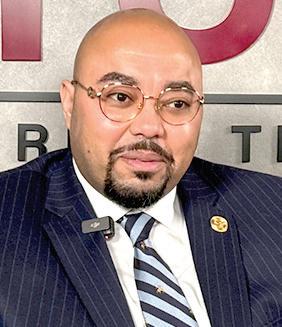
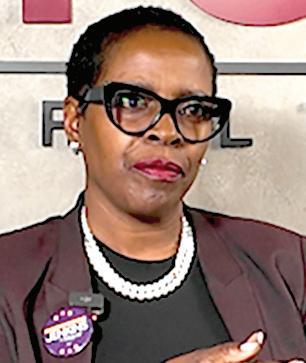
“Chancellor Ivery is a true transformational leader and an outstand ing CEO, who is more than worthy of the CEO of the Year Award he just re ceived, “ said Prof. James C. Mays, who teaches entrepreneurship and supply chain manage ment at WCCCD’s Corpo rate College. “In his 27 years at WCCCD, Dr. Ivery has elevated WCCCD to become nationally recog nized for excellence and innovation and preparing our students profession ally and personally to do great things in the world.”
“Transformation al change doesn’t just ask people to do cer tain things; it asks them to change their view of what’s possible and ex cites them to drive that change together because they believe that what they’re doing will create positive change for every one. That’s how entire systems change because people believe that they need to for themselves and others to live better lives.”
BLAC will hold a virtual town hall meeting to discuss its policy recommendations on Thursday, May 12 at 4 p.m. Join BLAC and a virtual audience in discussing the recommendations to support the Black community.
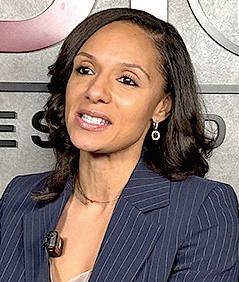
This story is part of a three-part series examining Black children and white curriculums in K–12 education. This was Part 2. Part 3 will conclude with a focus on community-led solutions with a hyper-local lens.
Ebony JJ Curry can be reached at ecurry@michronicle.com.
BLAC is housed in the Michigan Department of Labor and Economic Op Members rep resent many professional backgrounds, including economics, law, public safety, health and well ness, arts and culture and media. They leverage their experiences and expertise to make recommenda tions to the governor on critical issues affecting the Black community.
To learn more about BLAC and this upcoming event, visit www.michi gan.gov/BLAC.
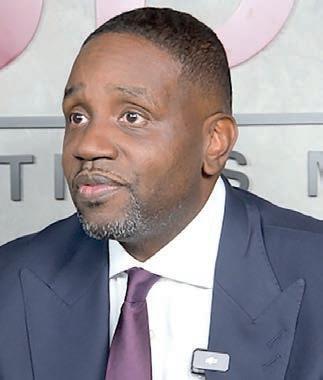


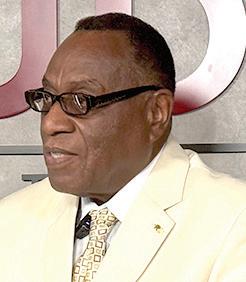
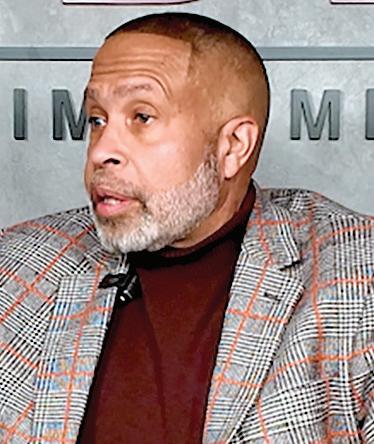

“In District 7, I have a huge immigrant community,” Durhal said.
Sheffield said she would expand the city’s Detroit ID program that was implemented by former Southwest councilwoman Raquel Castaneda-Lopez.
“We will ensure that the office also has language access is embedded or throughout city government, and we will continue to provide as many pathways to citizenship as possible in a quick and efficient way,” Sheffield said. “And so we will continue to empower all of our immigrant communities to feel seen safe, supported and safe, and we will do all that we can to do that and ensure that there is representation in this community, not just at a crisis, but consistent engagement.”
ICE data shows 483 people were deported from Michigan between January and June 2025. Most of those arrested and deported had not been convicted of a crime.
Here’s what the rest of the candidates said about how they would deal with ICE enforcement if elected mayor:
Joel Haashiim: “I respect self-determination of all people, and I fought my whole life for people to represent their themselves, their culture. So I respect that, and I will do all that I can to make sure that that is never infringed on. It has happened too much in this country.”
John Barlow: “People’s rights are being totally trampled — it’s becoming an atmosphere of fear. I will not as your next mayor stand by and be silent. Our leaders continue to have that platform and the microphone to bring attention while those ICE officers are trying to covertly get into our communities. I won’t stand by it.”
Todd Perkins: “I will activate our civil rights department. We ask for the courts to step in and stop these processes. Now, I won’t use the Detroit Police Department with ICE, but I will use the Detroit Police Department to monitor ICE as they go and as they come into our city to ensure safety... I will make sure that our city also has the services so that people who are approached and don’t speak the language, because if you don’t speak the language, you have no understanding, so therefore, you have no ability to protect your constitutional rights.”
Mary Sheffield: “I am a firm believer that no one should have to live in fear of separation from their family, going to church, going to school, going to their work of business... No, Detroit Police Department would never assist any efforts of ICE or the federal administration through ICE. We also will ensure that no city resources or staff is assisting in any federal immigration efforts. Because the mayor directs DPD in the chief, if there’s any officers who are racially profiling, we will ensure there is public transparency and accountability around any racial profiling.”
Solomon Kinloch: “We will follow the law with respect to coordination when requested with existing protocols. Enforcing immigration law is not the role of local government. Federal agencies have the authority and responsibility to enforce immigration laws across the country, including in Detroit. That said, if our people’s rights are being violated, if they are denied due process, or their human dignity is under attack, I will stand up and fight. Everyone deserves equal protection under the law and my administration will not stand by as pain and suffering are inflicted upon our community. I will do everything in my power to ensure everyone’s rights are protected and respected.” You can reach Sam at srobinson@michronicle.com.
A3 | July 30 - Aug. 5, 2025
Sponsored by JPMorganChase
Summer is here, and for many Americans, it’s vacation season.
It’s also one of the most expensive seasons to travel. With warm weather, school breaks and slower work schedules encouraging many to hit the road or book a flight during the summer months, prices for flights, hotels and destinations often reach their peak, which could put a damper on your dream vacation plans.
If you’re looking to get away and maximize your time out of office, these tips and tricks can help make seeing the world, or even just the U.S., a bit more affordable.
Start saving & take advantage of travel perks
Planning your vacation can start any time simply by saving money for your travel expenses. Look at where your money is currently going and see if there are items you can cut, such as subscriptions, entertainment and dining out.

Don’t underestimate the power of credit card points – they can make travel more rewarding and help offset costs. Explore the travel rewards your credit card offers. Travel cards can help you build up miles or rewards points to put toward flights, hotel stays or rental cars by rewarding you for everyday purchases.
Timing is everything
If your plans are more flexible, you may also want to consider traveling during the off-season for lower prices. Think about traveling in the month or two on either side of the peak season when tourists are less likely to visit. Whenever you travel, however, aim to book plane tickets about two months in advance, and start looking up flights as early as possible to get the lowest prices.
Sign up for airline price drop alerts and follow airlines via email newsletters and social media to keep atop any deals. Check for package deals as well, as airlines and hotels will often offer package deals at a discount to make sure no seats or rooms go empty.
As you make your itinerary, look for discounts at popular destinations. Many museums offer free tickets on certain days or at certain times of
See VACATION SEASON Page A-4
By Ebony JJ Curry SENIOR REPORTER
By the time most kids are learning how to open a lunchbox, Gail Perry-Mason’s young “investors” are learning how to open a stock portfolio. Across the city of Detroit, where wealth gaps have long been written off as inevitable, Money Matters for Youth is reshaping the narrative with a blueprint that starts early, builds intentionally, and reaches far beyond bank balances. What Perry-Mason has built goes far beyond a seasonal program thrown together for show. It’s a cultural shift in motion—rooted in legacy, powered by purpose, and fueled by the belief that when Black youth are given the tools of ownership and discipline, they become unstoppable forces in their own right.
Ask ChatGPTIt’s a cultural shift in motion—rooted in legacy, powered by purpose, and fueled by the belief that when Black youth are given the tools of ownership and discipline, they become unstoppable forces in their own right.
Money Matters for Youth is a Detroit-grown financial literacy initiative serving students ages 8 to 18. But this holds much more depth than just teaching kids to count pennies or write a one-off business plan. This is about teaching them how to grow capital, create sustainable wealth, and
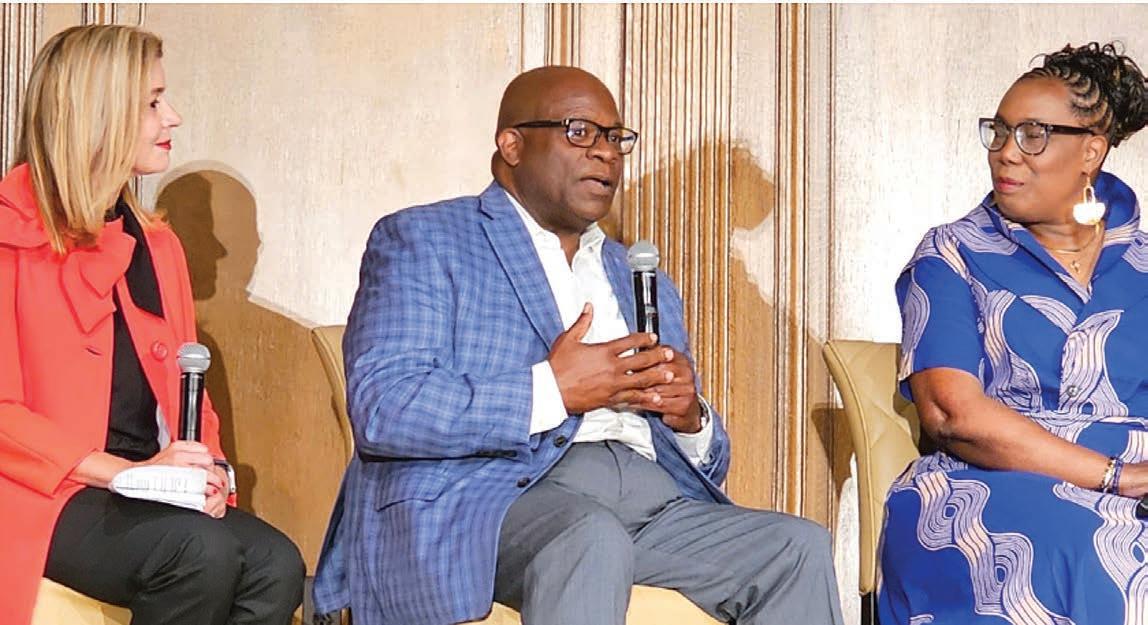
By Ebony JJ Curry SENIOR REPORTER
They used to call it “The Paper.” Rolled up and rubber-banded, dropped on porches before sunrise, passed across barbershop counters and church pews, clipped and taped to refrigerators. From Highland Park to Benton Harbor, the local newspaper wasn’t just how people got the news—it was how they knew their power.
Now, almost half of Michigan’s counties are down to just one or no local news outlet at all. Since 2005, the state has lost 40 percent of its newspapers. The number has dropped from 280 to around 202. What’s missing now can’t be replaced by tweets or push notifications. It’s the everyday, ground-level reporting that used to hold school boards, mayors, landlords, and police departments accountable. It’s the presence of a reporter in a town hall meeting, not just when there’s a crisis, but when policy gets shaped in real time.
That urgency brought more than a dozen leaders together on July 22 inside the Detroit Athletic Club. The gathering—organized by the Local Media Association alongside Northwestern’s Medill School of Journalism, Detroit PBS, Michigan State University, and Knight Foundation—called attention to what’s been disappearing quietly for years. The absence has grown loud. The summit focused on the consequences of that silence.
Tanisha Leonard, president of Pitch Black and chair of the LMA Foundation, made it plain. “This moment demands a united front,” she said. “We launched this to raise awareness and equip leaders… We hope that what we build in Michigan can be replicated in other states.” The goal wasn’t just to assess loss, but to chart a path toward rebuilding. The session was livestreamed by Detroit PBS and rebroadcast to reach a broader network of journalists, funders, and community stakeholders.
The data is clear. More than 58 percent of
journalism jobs in Michigan have been lost in the past 15 years. One in four newspapers has closed. Nationwide, 1,561 counties have only one remaining news outlet, while 206 have none. Michigan mirrors that pattern. Across the state, millions live in what researchers now call “news deserts”—regions where residents have little to no access to trusted, consistent local coverage.
Chuck Todd, longtime political journalist and former moderator of “Meet the Press,” moderated the summit’s core panel. When he asked leaders when this crisis began, the responses pointed to a gradual shift that gained momentum in the early 2000s. Nicole Avery Nichols, executive editor of the Detroit Free Press, explained what she saw. “I got into this business about 30 years ago and we haven’t been in crisis for the full 30 years, but what I can say now is that it’s shrinking… Since the 2000s I’ve seen staffing shrinking. There’s exciting things happening, but we can’t deny that journalism has gotten into a small space.”
Nichols emphasized the effect the pandemic had on newsroom operations and public need. “The pandemic and facing a global crisis clarified the need to amplify the commitment to our community. We’ve seen newsrooms shut down,” she said. “We are focused on partnerships… and the ability to amplify other media outlets. We just like everyone else are in a place where we need to create value for the viewer.”
The issue isn’t isolated to newspapers. Broadcast media has also seen reductions in staff, resources, and viewer trust. The ability to maintain consistent local coverage, particularly in regions without urban population centers, continues to decline. The reach of Detroit PBS can inform thousands across the state, but regions like Genesee County now rely on a single regularly published paper—The Flint Journal, which reduced its print schedule back in 2009.
Wendy Turner, executive director of Michigan Public, addressed the implica-
tions of losing federal public media support during the Trump administration. “We’re going to have to create deeper partnerships with our colleagues, build expanded relationships, and we want to reach more people and be more of service to the greater range of where these news deserts are,” she said. “In public media we do have diversity of funding sources. That is still a good model… But we’ve had a shock to the system.”
That shock has been felt across the state. The loss of federal funding and shrinking ad revenue—estimated at 60 percent over the last decade—have forced outlets to pivot. Many have turned toward philanthropy, events, and digital innovation just to keep going.
Hiram E. Jackson, publisher of the Michigan Chronicle and CEO of Real Times Media, shared the approach that kept his newsroom alive. “I wasn’t raised in this industry. I was a marketer, so my foundation is creative revenue,” he said. “The one thing that I knew was that the Michigan Chronicle was an organization that has had a lot of credibility, and for 90 years we’ve done everything not to compromise that. Twenty years ago we started an event division… That wasn’t popular, but today we do about 60 events. We have developed ancillary businesses to include in our newsroom. Without these creative revenues, we’d be out of business.” Jackson stressed the importance of reaching beyond expected circles. “We’re trying to diversify how people see our content… produce more video to broaden the reach,” he said.
Todd added, “media has the same problem as politics. They’ve gotten too far away from the people.”
Duc Luu, director of journalism at the Knight Foundation, noted that the trends being discussed have been in motion for more than two decades. “There’s been a 25-plus year decline in journalism. Each of
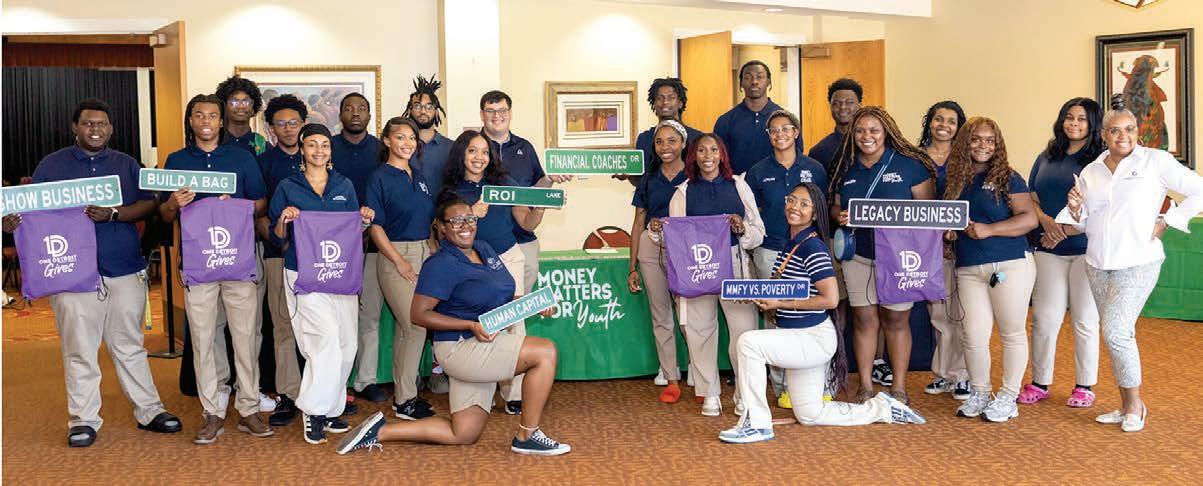
navigate economic systems that were never designed with them in mind. The program’s annual five-day camp builds more than knowledge—it builds identity, confidence, and community. And that’s what makes it powerful.
“Our students are investors because they are our investment in the future,” shares Perry-Mason. That guiding belief is stitched into every lesson, every spreadsheet, every portfolio and pitch deck created by a child who learns that financial power is cultural power. Money Matters doesn’t just teach budgeting. It teaches vision. It doesn’t just introduce entrepre-
neurship. It births it. Participants walk away with business ideas, etiquette training, and the foundational tools to become future franchise owners, tech founders, and even venture capitalists.
Gail Perry-Mason has witnessed it firsthand. Some of her mentees have gone on to become CEO’s of Chick-fil-A franchises right here in Michigan. Others now sit at tables in venture capital boardrooms, managing the very kind of investments they once simulated on worksheets as teenagers. That trajectory isn’t accidental—it’s intentional.
Each year, Perry-Mason’s
campers are introduced to what it means to have five streams of income, not just one. They map out their own Financial Gardens, learning to sow seeds of abundance with budgeting, saving, investing, and giving. From learning how to write thank-you notes and cook healthy meals to studying public speaking and ballroom dancing, students receive a holistic approach to life and leadership. They not only learn how money works—they learn how power circulates. That’s what makes this program transformational. And this summer, that transformation reached a new level.
By the time most kids are learning how to open a lunchbox, Gail Perry-Mason’s young “investors” are learning how to open a stock portfolio. Across the city of Detroit, where wealth gaps have long been written off as inevitable, Money Matters for Youth is reshaping the narrative with a blueprint that starts early, builds intentionally, and reaches far beyond bank balances. What Perry-Mason has built goes far beyond a seasonal program thrown together for show.
the day. Ticket and booking deals are often available for members of certain professions, such as education, health care and the military. Other cities offer museum passes that allow you to visit multiple museums for a flat rate.
Know what to skip
Once you’re at your destination, consider passing on expensive guided tours or private transit like taxis or ride shares. Instead, create your own city tour, look online for free walking tours or get around on public transportation.
If you’re visiting a popular monument or famous street, pass the “tourist trap” stores and restaurants and do your shopping and dining a few blocks away where prices are likely to be lower.
Broaden your horizons
Sometimes, you can have more fun at a lesser-known destination. Try some smaller towns over big cities, which can offer better prices on your hotel and dining experiences. Additionally, if you’re within driving distance of a big city, you can still go and enjoy it for a day.
If you are staying in a larger area, find a hotel outside of the most expensive part of the city but close enough that you’re not spending much getting to the sights.
Plan a staycation If a big trip still isn’t in your budget, that’s OK. There are still plenty of ways to get away, even if you stay in the comfort of your own home.
Take a day trip to a nearby town or plan a longer road trip through your state. You’ll still get to see new places and try new hotels. If you’re planning to visit a friend or family member, explore a new venue while you’re in
those moments has marked a lower low when it comes to the mission of informing our communities,” he said.
LaTrice McClendon, program director at the Knight Foundation, spoke to Detroit’s role as a center of innovation but made clear that gaps remain. “Detroit is a bright spot… but if the local news isn’t reporting on what we’re funding, how do we get people to know what we’re doing or who we are?” she said. “We fund those who are deeply in the community… We need more collaboration in this city. We can do better. As we invest, we are looking to make sure that folks are collaborating because we want sustainability, and how we see that is through partnerships and collaboration.”
Melissa Davis, network director at Press Forward, reinforced the role philanthropy can play in expanding access and building resilience. “This is an industry that has been in a crisis for years now,” she said. “The great thing that philanthropy can do is bring innovation capital to local newsrooms to try new things that they may not have been able to do within the last decade or two.”
Catherine Badalamente, CEO of Graham Media Group, addressed the foundation of community trust. “We matter so much because we care so deeply,” she said. “They’re our neighbors. The people in the newsroom get up every day and are committed to telling stories that matter to the community.”
that town. Exploring lesser-known destinations can offer unique charm without the usual crowds and costs.
The U.S. also has extensive state and national park systems with a reasonable per-car entrance price. To save even more money, bring a picnic!
The bottom line
Travel enriches our lives, and with some creative planning, you can enjoy memorable adventures without overspending. Using budget travel tips can help you add adventure to your life this summer without breaking the bank. Have fun finding strategic ways to cut costs while still having an enjoyable and fulfilling trip.
For more financial health tips, visit chase.com/financialgoals.
For informational/educational purposes only: Views and strategies described on this article or provided via links may not be appropriate for everyone and are not intended as specific advice/ recommendation for any business. Information has been obtained from sources believed to be reliable, but JPMorgan Chase & Co. or its affiliates and/or subsidiaries do not warrant its completeness or accuracy. The material is not intended to provide legal, tax, or financial advice or to indicate the availability or suitability of any JPMorgan Chase Bank, N.A. product or service. You should carefully consider your needs and objectives before making any decisions and consult the appropriate professional(s). Outlooks and past performance are not guarantees of future results. JPMorgan Chase & Co. and its affiliates are not responsible for, and do not provide or endorse third party products, services, or other content.
Deposit products provided JPMorgan Chase Bank, N.A. Member FDIC. Equal Opportunity Lender.
© 2025 JPMorgan Chase & Co.
Those words reflect the mission that brought so many to the summit. For Michigan’s Black press, for longtime publishers and new digital platforms, for public radio and small-town weeklies—the work has always been about service. Nichols added, “There’s nothing in this day and age as journalists that we snub our nose to that’s a need for the community.” She reminded attendees that 90 percent of journalism is service to people.
The summit at the Detroit Athletic Club marked a beginning, not a solution. Participants left with a mandate. Strengthen partnerships. Expand public media. Train the next generation. Fund innovation. Document truth. In Michigan, the urgency is clear. Over one million residents live with limited access to local news. The cost of doing nothing will fall on those already underserved.
Local journalism in Michigan needs more than conversation. It needs support. Community members can subscribe, donate, share stories, and show up for the outlets that continue to report on issues that shape daily life. Institutions must form partnerships that reach beyond their own walls. Philanthropy must stay close to the people doing the work. This moment calls for commitment to truth, service, and collaboration. Sustaining local news means investing in the people who report from the ground, reflect the community, and protect public trust.
Ebony JJ Curry can be reached at ecurry@michronicle.com.
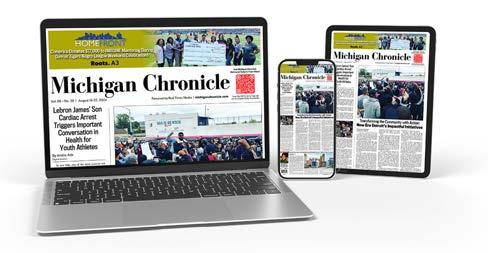

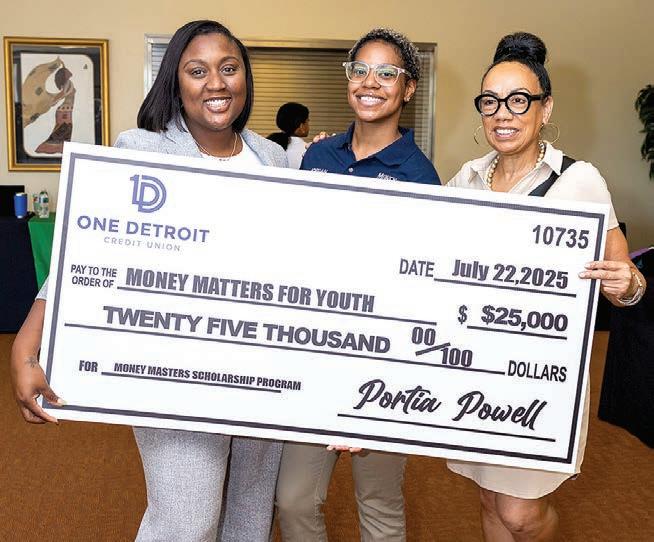
It’s a cultural shift in motion—rooted in legacy, powered by purpose, and fueled by the belief that when Black youth are given the tools of ownership and discipline, they become unstoppable forces in their own right.
Ask ChatGPTIt’s a cultural shift in motion—rooted in legacy, powered by purpose, and fueled by the belief that when Black youth are given the tools of ownership and discipline, they become unstoppable forces in their own right.
Money Matters for Youth is a Detroit-grown financial literacy initiative serving students ages 8 to 18. But this holds much more depth than just teaching kids to count pennies or write a one-off business plan. This is about teaching them how to grow capital, create sustainable wealth, and navigate economic systems that were never designed with them in mind. The program’s annual five-day camp builds more than knowledge—it builds identity, confidence, and community. And that’s what makes it powerful.
“Our students are investors because they are our investment in the future,” shares Perry-Mason. That guiding belief is stitched into every lesson, every spreadsheet, every portfolio and pitch deck created by a child who learns that financial power is cultural power. Money Matters doesn’t just teach budgeting. It teaches vision. It doesn’t just introduce entrepreneurship. It births it. Participants walk away with business ideas, etiquette training, and the foundational tools to become future franchise owners, tech founders, and even venture capitalists.
Gail Perry-Mason has witnessed it firsthand. Some of her mentees have gone on to become CEO’s of Chick-fil-A franchises right here in Michigan. Others now sit at tables in venture capital boardrooms, managing the very kind of investments they once simulated on worksheets as teenagers. That trajectory isn’t accidental—it’s intentional.
Each year, Perry-Mason’s campers are introduced to what it means to have five streams of income, not just one. They map out their own Financial Gardens, learning to sow seeds of abundance with budgeting, saving, investing, and giving. From learning how to write thank-you notes and cook healthy meals to studying public speaking and ballroom dancing, students receive a holistic approach to life and leadership. They not only learn how money works—they learn how power circulates. That’s what makes this program transformational.
And this summer, that transformation reached a new level.
In partnership with One Detroit Credit Union and with support from
the Federal Home Loan Bank of Indianapolis, Money Matters for Youth awarded $25,000 in surprise scholarships to 25 Detroit-area teens. The scholarships were not just symbolic. They were strategic. Each recipient also received their own One Detroit Collegiate Checking account, developed specifically for young adults pursuing higher education. These accounts offer no monthly fees, no minimum balance, and include credit-building tools, savings features, and financial guidance tailored to students navigating life after high school.
“This partnership created a real impact,” said Perry-Mason. “I’m so grateful to One Detroit Credit Union for banking on our youth and helping us plant seeds that will grow for generations.”
What makes this partnership so groundbreaking is that it doesn’t stop at knowledge—it follows through with real-world application. The scholarship funds were deposited directly into each student’s new account, giving them immediate access to banking tools while reinforcing what they learned during camp. From purchasing books and school supplies to covering transportation costs, students were given the ability to make decisions grounded in financial literacy and backed by institutional support.
Portia Powell, president and CEO of One Detroit Credit Union, underscored that sentiment. “Our youth deserve access to more than just knowledge. They deserve access to financial tools that help them put that knowledge into action,” she said. “By offering education, real-world banking experience and scholarship funding, we are helping them build a foundation for long-term financial success.”
Long-term success has always been the goal. But Perry-Mason knows that before young people can build the future, they have to first be seen in the present. At a time when Detroit youth are often overlooked in economic development conversations, programs like Money Matters for Youth speak directly to that gap. They prove that when resources are delivered with cultural competence and deep community understanding, outcomes shift.
For nearly 29 years—since founding Money Matters for Youth in 1996, Perry-Mason has led the program with unwavering dedication, mentoring thousands of Detroit youth long before financial literacy became a trending topic. She has never done this work for cameras or headlines. Her commitment runs deeper than public recognition—it’s rooted in a genuine love for Black children and a belief that access to economic education is a human right. Perry-Mason is a true community pioneer whose impact stretches far beyond the classroom.
She shows up consistently, invests in young people holistically, and pours into them not for applause but because she knows their brilliance deserves to be nurtured.
At the camp, students are taught how success and service go hand-inhand. Perry-Mason instills the principle that “Success benefits others first.” Each camper is introduced to a network of mentors, receives exposure to community resources based on need, and is encouraged to give back from day one. These lessons aren’t saved for adulthood. They’re taught as tools of empowerment now. That’s what makes the work resonate far beyond the classroom.
The camp also includes golf lessons—because, as Perry-Mason reminds her students, many major business deals are sealed on the golf course. It’s this kind of strategic cultural awareness that sets Money Matters apart. Every touchpoint prepares youth to enter rooms they’ve historically been excluded from—and to take ownership once they get there.
Ask ChatGPAt the camp, students are taught how success and service go hand-in-hand. Perry-Mason instills the principle that “Success benefits others first.” Each camper is introduced to a network of mentors, receives exposure to community resources based on need, and is encouraged to give back from day one. These lessons aren’t saved for adulthood. They’re taught as tools of empowerment now. That’s what makes the work resonate far beyond the classroom.The camp also includes golf lessons—because, as Perry-Mason reminds her students, many major business deals are sealed on the golf course. It’s this kind of strategic cultural awareness that sets Money Matters apart. Every touchpoint prepares youth to enter rooms they’ve historically been excluded from—and to take ownership once they get there.
Over the years, Perry-Mason has mentored an insurmountable number of students—many of whom return to volunteer, to teach, and to pass the torch. The generational ripple is clear. But what makes her work so deeply compelling is the way it redefines what wealth looks like, and who gets to build it.
Money Matters for Youth centers financial literacy as a civil right. It treats budgeting, investing, and entrepreneurship as tools of liberation. And in a city like Detroit, where disinvestment has long been policy, this work becomes not only educational—but political, cultural, and spiritual.
Perry-Mason’s leadership makes that possible. Her decades of advocacy, financial education, and intentional mentorship have built a model that banks, educators, and policymakers would do well to follow. This isn’t about saving youth from hardship— it’s about preparing them to lead with purpose.
The path to economic equity for Black Detroiters begins with access. But it doesn’t end there. It requires systems, support, and stewardship— everything this program provides. By investing in youth with practical tools, real scholarships, and culturally grounded mentorship, Gail Perry-Mason and her partners are rewriting the script on what’s possible for Detroit’s next generation.
Those who want to support or learn more about Money Matters for Youth can look into future partnership opportunities and consider ways to expand this model across neighborhoods, schools, and even policy frameworks. Programs like this deserve to be scaled—not just applauded.
What Gail Perry-Mason is building is bigger than finance. It’s legacy in motion. And Detroit’s young investors are living proof.
Ebony JJ Curry can be reached at ecurry@michronicle.com.
Federal Public Law 98-435 requires that polling places be accessible to disabled voters.
If a polling location is not disabled accessible, this law allows the assignment of an alternate polling place. However, several polling places which were previously inaccessible are now accessible to disabled voters.
Disabled voters are entitled to vote at the polls within the precinct where possible. Pollworkers are obligated to provide whatever assistance is needed to facilitate the voting process.
Disabled voters with an inaccessible polling place are eligible to vote without notice at the:
Department of Elections 2978 W. Grand Blvd. Detroit, MI 48202
until the close of voting at 8:00 p.m. on Election Day.
If additional information is needed, or to confirm disabled accessibility, please contact the Department of Elections office at (313) 876-0190.
Janice M. Winfrey City Clerk & Chairperson
Detroit Election Commission
A5 | July 30 - Aug. 5, 2025
By Dr. Anthony Kellum
In 2025, the Black homeownership rate in America stands at approximately 44–46%.
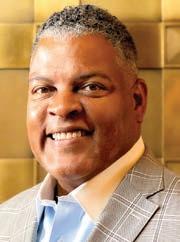
That’s only 3 to 5 percentage points higher than it was in 1968 the year the Fair Housing Act was signed into law. Let that sink in. Fifty-seven years have passed, and yet, despite legislation intended to outlaw housing discrimination, Black Americans remain largely shut out of the American Dream of homeownership. Meanwhile, white homeownership has soared to over 70%, exposing a persistent and deeply entrenched racial gap in property ownership.
1968: A Landmark Law with Little Muscle
The Fair Housing Act of 1968 was signed one week after the assassination of Dr. Martin Luther King Jr. It was meant to be a turning point a legislative acknowledgment that housing discrimination based on race, color, religion, or national origin was morally and legally unacceptable. But while the Act promised equality, it lacked real teeth.
There were no strong enforcement mechanisms to ensure compliance. There were no substantial penalties for violators. And there was little federal or local will to monitor systemic racism embedded in banking, real estate, and lending institutions.
1968–2025: A Dream Deferred
In the decades that followed, Black Americans continued to face:
Redlining, where banks and the government refused to back mortgages in Black neighborhoods. Predatory lending, which targeted Black borrowers with high-interest subprime loans even when they qualified for better terms.
Discriminatory zoning and appraisal practices, which suppressed Black wealth creation by devaluing homes in majority-Black communities.
Economic exclusion, as Black families earned less, inherited less, and had fewer opportunities to build generational wealth.
All of this added up to what we see today: a Black homeownership rate that has barely moved in almost six decades.
The Homeownership Gap: Not Just a Statistic, But a Structural Crisis
The Black-white homeownership gap in America is no accident it is the outcome of intentional policy decisions, institutional racism, and deeply embedded structural barriers that have persisted across generations. In 1968, when the Fair Housing Act was signed, the Black homeownership rate hovered around 41–43%. Today, in 2025, it sits at just 44–46%. Meanwhile, white homeownership has surged past 70%, creating a staggering 25+ point gap, a gap that has actually widened since the passage of the very law that was supposed to close it. How is this possible? Because racism evolves. It didn’t vanish with a signature, it became more subtle, more algorithmic, more embedded in pricing structures, zoning laws, and lending decisions. Discrimination adapted to modern systems and continued to lock us out.
This matters because. Homeownership isn’t just about shelter, it’s about equity that builds generational wealth, stability that anchors families and communities, and peace that provides security and a future to plan for. The gap in ownership is not just an economic divide it is
See FAIR HOUSING ACT Page A-6
By Ebony JJ Curry SENIOR REPORTER
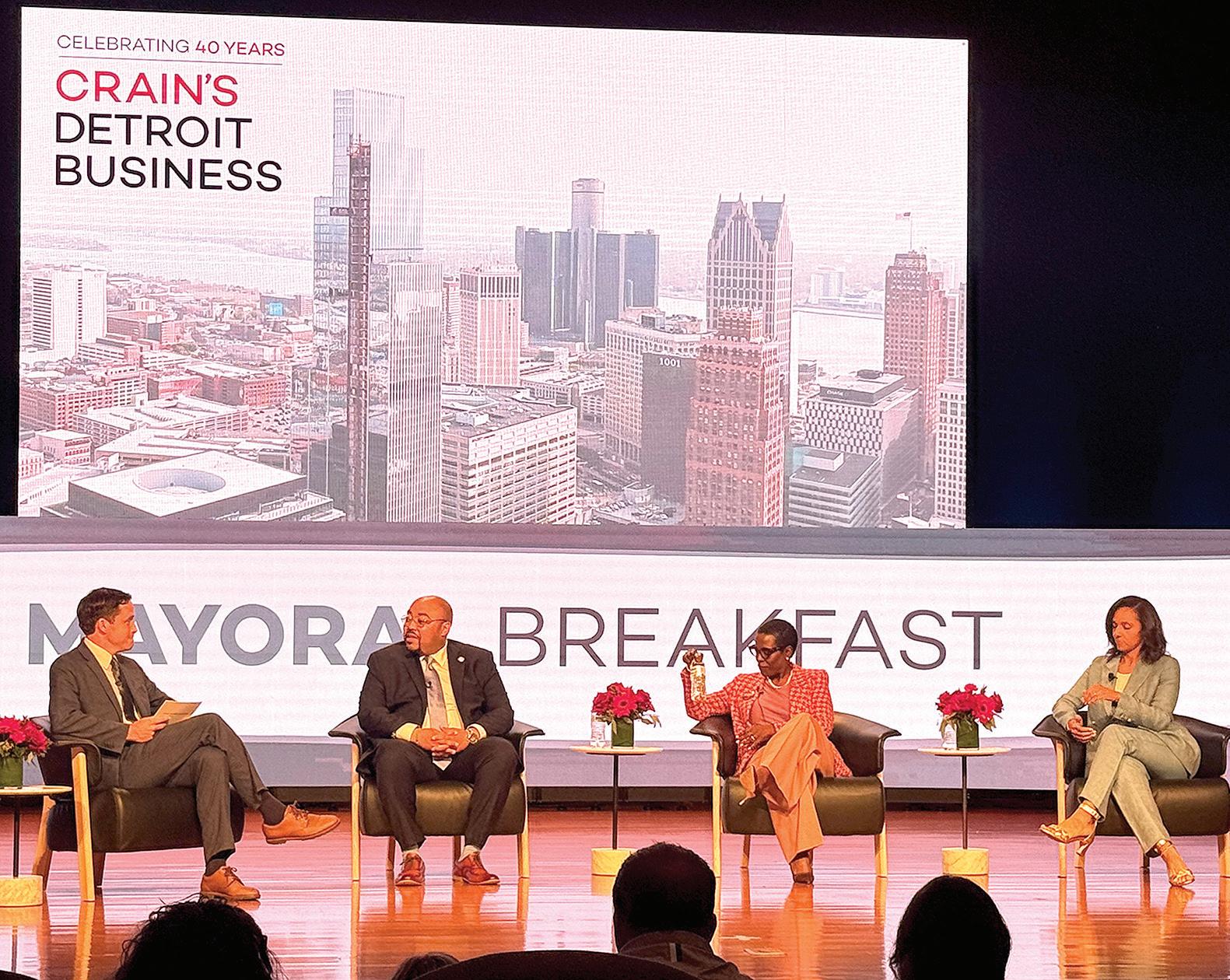
By Sam Robinson SENIOR REPORTER
Detroit mayoral candidates are pitching plans to generate new revenue to bolster the city’s bottom line without burdening residents already liable for higher-than-average annual property taxes.
City council president Mary Sheffield and nonprofit CEO Saunteel Jenkins have both laid out plans to create new funding mechanisms through tourism tax or a local “penny tax,” while councilman Fred Durhal has championed a blight tax targeting speculators.
Durhal wants to introduce a blight tax to charge 25 times the property tax millage for non-owner-occupied structures on commercial corridors, as well as in the neighborhoods.
Sheffield says she would look at an entertainment tax to capitalize on the economic activity in downtown Detroit, she said at a recent candidate forum hosted by the Southwest Business Association and other business groups at the Brooklyn in Corktown.
Detroit’s property tax base shrunk as its population declined, which led to the city raising property tax rates to maintain services. While outgoing Mayor Mike Duggan is able to champion reductions property tax millage in the final years of his tenure, candidates are expressing concerns over the city’s financial future. With benefits promised to retirees and infrastructure improvements needed across the city, some candidates are pitching ideas to create new taxes.
Sheffield has floated an entertainment tax for years.
In 2017, then-state Rep. Sylvia Santana, D-Detroit, introduced House Bill 5174, which would have levied a 10% excise tax on entertainment events with a seating capacity of 500 or more.
Under the legislation, “entertainment events” included zoos, live theater, museums, opera, professional sporting events,
concerts, temporary or transient entertainment productions, botanical gardens, amusement parks, and temporary or transient art, music, theatrical, dance, literary or cultural festivals.
It also exempted the following events from the tax: high school, middle school, or elementary school events, events sponsored by a nonprofit or charitable organization, and collegiate athletic events.
Santana’s bill provided that 75% of the funds from the amusement tax would be used to fund “other post-employment retirement benefits” for police and firefighter retirees in the municipality where the tax was collected. The remaining 25% would be used to fund retirement benefits for police and firefighters in the municipality where the tax was collected.
Sheffield said it’s imperative to increase city revenue to support neighborhoods, public safety, transit and infrastructure. She did acknowledge the hesitancy from business groups to support new taxes, saying continuing to grow Detroit’s population is the chief responsibility of the next mayor.
Sheffield has also said she would consider a “half-penny” or 0.5% city sales tax as a potential revenue source for the city of Detroit.
Sheffield told Michigan Chronicle on Wednesday the tax would be similar to a funding model in Columbus, Ohio, where a half-penny sales tax increase voters approved in 2024, will fund transportation improvements, sidewalks, and bike paths.
A study conducted by the Citizens Research Council of Michigan found that an amusement tax with a flat $3 fee on tickets would raise approximately $8 million from sports games and concerts held at Ford Field, Comerica Park and Little Caesars Arena. The study was based on attendance records.
Ford Field, where the Lions play, sold out every game for the first time this past season. Games attracted a mean of 64,850 attendees, 6.5% more than the

mean attendance of 60,129 from the previous 16 seasons, according to the research council report.
Sheffield noted such a move would need the approval of state lawmakers. Jenkins said she would leave “all options on the table” as far as the creation of new taxes.
“We can continue to reduce the millage gradually, but it does not give real relief to Detroiters,” Jenkins said during the WDIV debate last month at Wayne State. “I would find a new revenue source such as what I’m calling a penny for Detroiters local tax. That 1 cent can generate over $100 million, which would give us a revenue source that enables us to dramatically reduce our property taxes and make it more affordable to buy a home and live here.”
American Coney owner Grace Keros, who attended the mayoral forum in Corktown last week, told Michigan Chronicle she doesn’t want to see any new taxes until property taxes are reduced.
Former police chief James Craig, attorney Todd Perkins and councilman Fred Durhal III, who recently earned the endorsement of business leaders at the Detroit Regional Chamber PAC, both said they would oppose adding new taxes on residents.
Durhal said it could discourage business investment and harm local venues, while Perkins said an entertainment tax could hurt local businesses by creating a reluctance to invest downtown.
“I’ll just say, no further taxation,” Craig said. “We don’t need it. We shouldn’t do it. It’s a bad idea.”
Craig questioned the constitutionality of taxing folks who live in the suburbs who come into the city to enjoy entertainment.
“That would be wrong — you know, we want business coming into our city,” Craig said.
You can reach Sam at srobinson@ michornicle.com.
From page A-5
Meanwhile, Michigan Women Forward, a Detroit-based nonprofit, was awarded $200,000 for its Founder Forward program. This initiative supports founders already operating in Michigan, as well as “boomerang” talent—people with Michigan roots looking to return home. Selected participants will receive housing and relocation assistance, coworking space, mentorship, and access to business networks designed to accelerate growth for women and minority-led businesses.
This dual focus—on both rooted residents and returners—raises deeper questions Detroiters have been asking for years: Who does growth prioritize? How is equity being defined? And are legacy residents truly centered, not just included?
Michigan’s Chief Growth Officer Hilary Doe has emphasized that Detroit is not just a participant in this effort—it’s central to the state’s broader growth strategy.
“The state’s growth is inextricably linked to the continued growth and prosperity of the city of Detroit,” Doe said. “For that reason, it’s fitting that of the approximately $1.4M the Growth Office has invested in our flagship program, Make MI Home, $660,000 of that total has gone to Detroit-based initiatives designed to directly benefit Detroiters.”
Make MI Home is a first-in-the-nation program designed to support local strategies for population growth. Rather than one-size-fits-all solutions, cities and regions are empowered to shape programs that reflect their own communities’ needs and identities.
“Following their guidance, the program is designed to center local voices and allow cities, regions, or local organizations to design talent retention and attraction strategies they’d like to launch that are unique to their community’s goals,” Doe said.
For Detroit, that goal has always been clear: build prosperity that reflects the people who have always carried the city. According to Doe, public feedback emphasized the need to invest in entrepreneurs, small business owners, and job creators who could anchor Detroit’s economic recovery from within.
“Those have included a strong emphasis on the importance of retaining entrepreneurs and small business owners to build wealth, create jobs that will retain and attract talent, and ultimately grow their companies here–a strategy for both population and economic growth.”
This new round of grants follows previous Detroit-based awards through Make MI Home, including $250,000 to support Wayne State University and TechTown Detroit’s Live, Innovate, Play program, which provides housing support, mentorship, coworking space, and innovation challenges that focus on issues impacting Detroiters.
According to Doe, the Growth Office’s broader commitment to equity extends across its policy portfolio, including “Pre-K for 4-year olds across the state, to workforce in the classroom and free community college access, to historic housing investments.” Each of those initiatives, she noted, were born from public engagement and community feedback.
Another issue identified through that engagement was the lack of meaningful ex-
page A-5 he said. “Beyond attracting and retaining talent, this effort will be about creating jobs for Detroiters. Small businesses and startups create jobs, and we must make sure Detroiters reap the direct benefits of this job creation through securing better work, higher wages, and wealth generation.”
a visible, measurable manifestation of systemic racial oppression. And every delay in ownership is a delay in freedom.
Where do we go from here? The time for symbolic gestures is over. We need strong enforcement of fair housing laws, targeted investment in Black communities, financial literacy programs that start early and go deep, and access to fair lending products FHA, VA, Conventional, Non-QM that actually serve the needs of our people. Most importantly, we need a cultural shift that understands that Property is Power! Top of Form Final Word: Hope + Action
We are not powerless. We are not behind because we’re incapable we’re behind be-
posure for young people—many of whom leave the state never fully realizing what opportunities already exist here. To address this, the Growth Office launched field trips across cities including Detroit, Grand Rapids, and Flint, connecting students with innovation ecosystems and job opportunities. “Last year, the Growth Office took more than 230 students on similar field trips,” Doe said. “More than 90% of participants said they were more likely to accept a job offer in Michigan. The next one takes place on July 25 in Detroit, where we expect more than 130 young people to attend.”
Local partnerships have also become a cornerstone of this strategy. One of the most visible collaborations is with Black Tech Saturdays, a Detroit-grown movement that’s become instrumental in both retaining and attracting Black tech talent. In partnership with the Growth Office, Black Tech Saturdays hosted events in Florida and Texas—two states with high in-andout migration from Michigan. Those efforts led more than 80 out-of-state attendees to travel to Detroit for Black Tech Saturdays events the following month.
“It’s critical to the entrepreneurs building in Detroit and across the state that we continue to attract the talent, investment, and visibility to our innovation ecosystem that is necessary for scale,” Doe said.
Beyond outreach, the Growth Office has also launched a statewide Welcome Program that includes access to Michigan parks, free pre-K, community college, and discounts with local businesses. This applies to both new residents and recent graduates, offering incentives to stay, live, and grow within the state.
Still, Detroiters know better than most that investments often come with conditions. Growth has to be measured not only by who arrives, but by who remains. A tech fellowship or housing stipend alone won’t solve displacement, income inequality, or systemic gaps in access to capital.
That’s why the underlying message from leaders like Doe is being watched closely: “Detroiters are the reason for Detroit’s recent growth. The hard work from thousands of people over many years, the fast-growing start-up ecosystem, the local talent that has helped attract new clean energy investment and manufacturing, the ‘buzz’ about the city—all of that is because Detroiters are who they are.”
She added, “All strategies for growth should be rooted in ensuring those same Detroiters get connected to opportunity and prosperity and see their brightest future right here in the state. That work will also serve as a beacon to folks across the country who want to be part of the incredible community that exists here in the city.”
It’s a bold assertion—but one that must be proven through continued transparency, results, and re-investment. As Doe said, “Ensuring every Detroiter is connected to opportunity, shared prosperity, and can build their brightest future right here in Michigan is our goal for growth.”
Detroit has momentum. Growth in Michigan’s young adult population is outpacing 45 other states. Sixty-six percent of Michigan counties saw population increases. The Make MI Home program has created 10 locally designed programs to reflect that momentum.
But Detroiters know momentum isn’t the same as justice. Justice means results for the people who stayed.
That’s the measure this moment will be held to—not just the size of the check, but whether it reaches the hands of those who have been holding the city up all along.
Ebony JJ Curry can be reached at ecurry@ michronicle.com.
cause the system was never built for us to win. The very systems that locked us out can be challenged, exposed, and dismantled. But we can’t fight them with hope alone we need strategy, we need action, and we need economic discipline. It starts in our own households get informed, get organized, fix your credit, and start saving. Talk to your children about owning land, building equity, and creating legacy. Make ownership a non-negotiable value in your family. This is not optional, we fight by becoming economically unshakable. We are the answer we’ve been waiting for. Let’s build. Let’s buy. Let’s own. Because when we own, we rise
Property is Power! is a movement to promote home and community ownership. Studies indicate homeownership leads to higher graduation rates, family wealth, and community involvement.

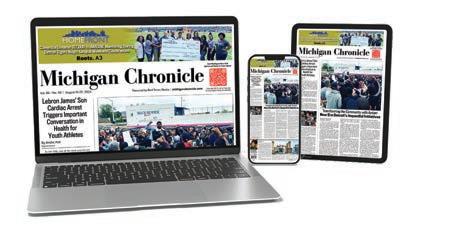

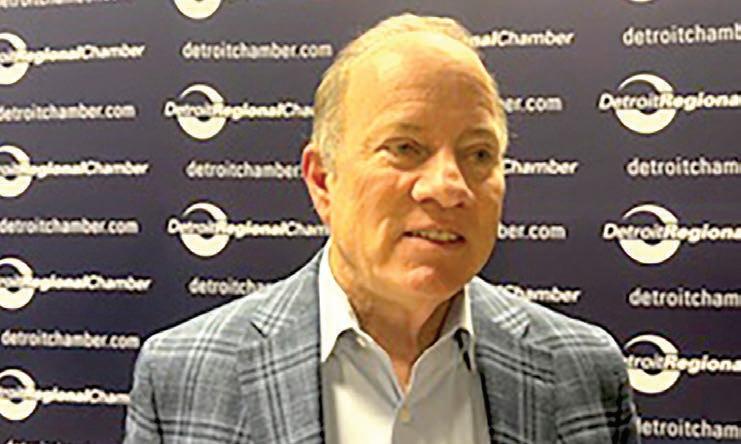
By Sam Robinson SENIOR REPORTER
Detroit Mayor Mike Duggan’s independent gubernatorial campaign is going all in on finding middle ground.
While the city’s outgoing three-term mayor received the endorsement from business leaders at the Detroit Regional Chamber PAC, Duggan says he’s not turning his back on the various labor groups who have already endorsed him.
“You say they have competing goals, but when Dan Gilbert builds buildings, it’s good for the building trades and for everyone looking for a job,” Duggan said in an interview with Michigan Chronicle. “Everyone assumes business has to fight labor, the environmental group has to fight the business group — in most cases the right answer is two sides working together on middle ground.”
The chamber said it typically would wait to drop their endorsement until the general election, which isn’t until November 2026.
“This year, though, chamber leaders said they couldn’t wait,” the group said.
“The chamber and businesses across the state are growing increasingly concerned about the inability of our political parties to find common ground and move Michigan forward,” Chamber president Sandy K. Baruah said in a statement. “Throughout his business and government career, Mike Duggan has proven he can bring people together to work toward common goals. Voters across Michigan are tired of the political infighting; they are clamoring for results-driven leadership, which is exactly what Mike has brought to every leadership position he’s held.”
The chamber said the decision to endorse Duggan was unanimous. The PAC was the first organization to endorse Duggan on his
write-in campaign for mayor in 2013, and members cited his tenure as mayor as the reason for their endorsement for his bid for governor.
“Mayor Duggan’s tenure in Detroit has been a case study in effective, consistent leadership,” PAC chairman David Foltyn said in a statement. “He has demonstrated a unique ability to bring stakeholders together to solve generational challenges. The business community has full confidence that he will bring that same steady hand and relentless focus on results to Lansing, creating the stable, pro-growth environment Michigan needs to compete on a global scale.”
Duggan, in an interview last week, told Michigan Chronicle both sides are realizing spending big money to win elections isn’t improving the conditions of Michigan residents. He noted the partisan swings that happen every eight years in the state halt continuity and makes it harder for the state to get ahead as rules on school curriculum and economic development.
“What I’ve done in Detroit is build coalitions,” Duggan said. “All the years where Democrats ran on attacking business and the Republicans ran attacking unions — it’s time to put that behind us.” Duggan has been endorsed by the Carpenters and Millwrights Association, Detroit Plumbers Local 98, Unite Here Local 24, Detroit Fire Fighters Association Local 344, plus other labor groups.
Lt. Gov. Garlin Gilchrist, Secretary of State Jocelyn Benson and Genesee County Sheriff Chris Swanson are running for governor as Democrats. On the Republican side, U.S. Rep. John James, former Attorney General Tom Leonard and former Attorney General Mike Cox, have announced campaigns. Gov. Gretchen Whitmer is term limited. You can reach Sam at srobinson@ michronicle.com.
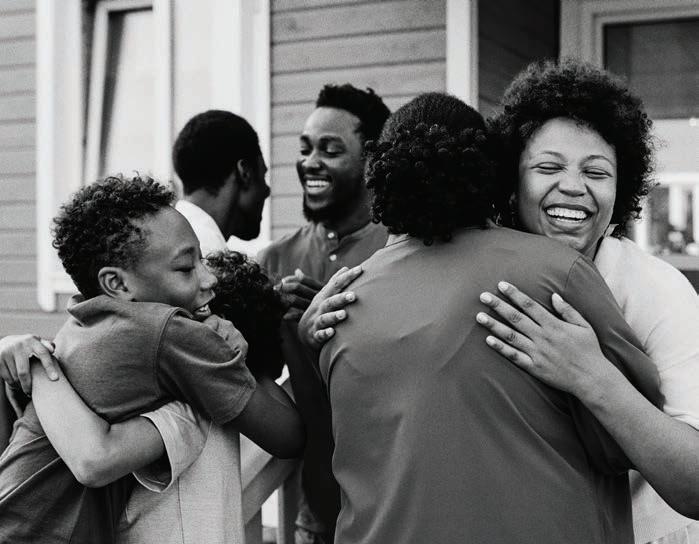
By Ebony JJ Curry SENIOR REPORTER
The Detroit Regional Chamber made its move. And this time, it didn’t wait for party lines or primary outcomes to determine its path. Instead, Michigan’s most influential business voice announced its early endorsement of Mayor Mike Duggan’s independent run for governor, signaling a shift in the political center of gravity before the 2026 race has even officially taken shape.
This endorsement came ahead of both the Republican and Democratic gubernatorial primaries—a break from the Chamber’s more conventional timeline. The decision reflects more than a fondness for Duggan’s tenure. It’s a message to Lansing and beyond: pragmatism is still the Chamber’s political currency, and it will spend it where it sees stable returns. Duggan has built a reputation as a manager, a fixer, a deal-closer. For the business community, that kind of leadership reads as predictable, even if his recent political pivot does not.
After ten years leading Detroit as a Democrat, Duggan’s decision to run for governor without a party was not just unusual. It was strategic. It aligned with a growing sentiment among moderate voters and business interests that the traditional two-party gridlock has hamstrung Michigan’s ability to push forward with collaborative policy. Duggan’s independent bid opens a new chapter in a long political career—one marked by a comfort with power, relationships, and backroom negotiation.
He’s no stranger to the inner workings of political machines. Duggan built his career inside them. His departure from the Democratic Party isn’t a rejection of legacy, but rather a recalibration. He still has deep roots in the structures he once helped lead, but his campaign now speaks to voters who feel the parties have drifted from practical governance. The Chamber’s endorsement reflects that sentiment. This was a calculated political endorsement rooted in shared philosophy, not just loyalty.
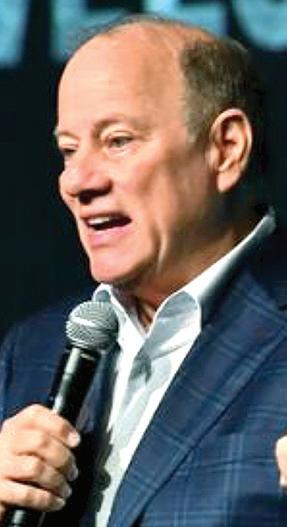
At this year’s Mackinac Policy Conference, Duggan stood tall. The energy in the room made it clear who had the Chamber’s attention. The business leaders, policy analysts, and political financiers weren’t just exchanging pleasantries— they were taking mental notes. Duggan has media saturation in Southeast Michigan, but that event hinted at his potential reach across broader corners of the state. Organizers say there’s momentum building in places like Kent, Grand Traverse, and Emmet counties. The mayor is no longer just Detroit’s name on the ballot. He’s positioning himself as a candidate for Michigan writ large.
Still, this endorsement was met with side-eyes and raised brows from within Democratic ranks. Some were already uneasy about Duggan’s rumored gubernatorial ambitions. But it was his decision to run as an independent—and the Chamber’s swift move to endorse—that sent party strategists into a quiet frenzy.
For Democrats, Duggan’s name now reads less as an opportunity and more as a risk. Their concern isn’t limited to whether he can win. It centers on whether his presence will fracture their voting bloc just enough to usher a Republican victory through a divided electorate. That fear isn’t unfounded.
Michigan has a long history of political fluidity. Voters switch parties, cross primary lines, and turn out in surprising ways. With a Republican field packed with familiar names—former Attorney General Mike Cox, former House Speaker Tom Leonard, Michigan Senate Minority Leader Aric Nesbitt, U.S. Representative John James, and Anthony Hudson—there’s no shortage of conservative competition. But none of those names alone create as much Democratic anxiety as the idea of a three-way race.
On the Democratic side, there’s a credible bench: Secretary of State Jocelyn Benson, Lieutenant Governor Garlin Gilchrist, and Genesee County Sheriff Chris Swanson. Each brings unique appeal, but none yet hold a commanding lead in the race. Duggan’s entry into that mix complicates the equation. He doesn’t just pull votes from one lane— he pulls credibility, media cycles, and donors.
What’s also adding fuel to the political fire is Duggan’s online banter. After Elon Musk called for a third-party alternative to break the current political duopoly, Duggan posted a quick response: “now you’ve got my attention.” That line triggered speculation about his ideological leanings and associations. Some viewed it as a joke. Others saw it as a signal. Democrats wasted no time criticizing the move, questioning his priorities and alliances.
Duggan later clarified that if elected, Musk would be the first person he’d visit—citing his goal to bring Tesla to the Detroit Auto Show. But the statement—on its face—raised eyebrows. Even if meant as light political theater, the reference landed with unease in a state where Musk’s political influence and views remain polarizing.
Despite that turbulence, Duggan’s camp remains confident. His campaign isn’t anchored in party rhetoric or ideological purity. It’s running on executive leadership, results, and vision. That’s exactly why the Detroit Regional Chamber stepped in early. Its endorsement isn’t about lighting fires on the left or right. It’s about backing a candidate who they believe can win and govern with a level head. Still, this move leaves Democratic strategists with a narrow path forward. Without a clear front-runner and with Duggan courting centrist and left-leaning independents, there’s legitimate concern that the general election could tip the scales toward a Republican nominee—especially in a year when the presidency is also on the line and national partisanship runs high.
The Chamber’s decision also reflects its frustration with both parties. For years, it’s worked to champion issues like workforce development, infrastructure investment, and fiscal stability. But as national politics drift further into ideological extremes, it has found fewer allies willing to focus on what it considers pragmatic solutions. Duggan’s brand of technocratic governance appeals to that sensibility. For them, this endorsement is an investment in continuity.
What remains to be seen is whether Duggan’s independent run can build a durable coalition. Michigan’s electorate doesn’t always embrace centrists, but it does reward clarity and conviction. Duggan’s strength will depend on how well he can convince voters that independence doesn’t mean isolation—and that his platform will protect their healthcare, their jobs, their schools, and their cities.
The 2026 election won’t be a typical one. With a Republican president on the ballot and a Democratic governor stepping down, Michigan stands at a political crossroads. The stakes stretch far beyond party loyalty. They touch policy, power, and people’s everyday lives. Detroit will watch this race closely. Duggan’s legacy in the city is complex. Some praise his economic development work. Others critique the impact of gentrification, tax foreclosures, and school closures during his tenure. But what’s clear is that his next chapter will shape not just Detroit’s future—but the direction of Michigan politics at large. In this moment, the Chamber’s early endorsement forces a new political conversation. It reorders expectations and puts every candidate on notice. This isn’t business as usual. This is the business community betting on its own definition of leadership—and doing so before the voters even pick their party’s nominees.
For Black communities across Michigan, particularly in Detroit, this election will be a test. Not only of which candidates listen, but of who is willing to act boldly and deliver real results. Duggan’s run adds new questions to that equation. And the answers won’t come from endorsements alone. They’ll come from turnout, from trust, and from truth-telling campaigns that meet people where they live. Ebony JJ Curry can be reached at ecurry@michronicle.com.

By Ebony JJ Curry SENIOR REPORTER
Detroit doesn’t flinch when things get hard. But what happens when a community that already stretches every dollar is told that $171 million in promised education funding won’t show up? What happens when summer programs that feed children, support working parents, and keep students safe after school are blindsided—without warning, without backup?
That’s the harsh reality facing school districts and nonprofit education providers across Michigan after the Trump administration moved to freeze federal funding already approved by Congress. Michigan has joined more than 20 states in filing a lawsuit against the administration to challenge what many are calling a reckless and politically motivated decision that puts children’s futures on hold.
The U.S. Department of Education announced on June 30 that it would stop distributing money to state agencies for six critical programs. These programs provide services to immigrant students, English learners, after-school care, classroom instruction, mentoring, and school wellness—support systems that wrap around children and strengthen entire communities.
Michigan State Superintendent Dr. Michael Rice didn’t mince words. Local districts across Michigan had already mapped out how this funding would support the 2025–2026 school year. “Plans had already been made for money to be put toward professional development, mentoring, tutoring, before and after school care, technology, and mental health support,” Rice said. Districts typically receive allocations by April. This year, only partial payments arrived in May. Then, just as summer began, the remaining grants were placed under “review.” On July 1, the door slammed shut.
For educators and nonprofit leaders working with Michigan’s most vulnerable children, this decision wasn’t just unexpected—it was destabilizing.
“This was completely unexpected,” said Sandy Ehlers, Program Director for the SEEDS Ecology & Education Centers EcoSchool, a nonprofit that runs after-school and summer programs in low-income rural communities. “Funding has never been taken away, especially after it is voted on and has been approved.”
sociated Press, the Trump administration abruptly halted distribution, claiming that some schools used federal education dollars to support undocumented students and LGBTQ+ inclusion initiatives. The administration labeled these efforts part of what it called a “radical leftwing agenda.”
The politics of the moment are colliding with children’s lives. Superintendent Rice said the federal government has failed to provide any real clarity. “The Trump administration has been opaque on what its review of the funding entails, giving no details.”
Left in the lurch, local school leaders are scrambling. Rice said superintendents are now combing through available funding sources, looking for ways to cover the gap. But there’s no guarantee those efforts will be enough—or come in time.
“Our schools and school districts rightfully believed that funds appropriated by Congress and signed into law by President Trump would be forthcoming,” Rice said. “Now schools are left to scramble to try to figure out how to provide programs that are vitally important to children.”
Attorney General Dana Nessel’s office said the state is stepping in to challenge what it sees as an overreach. Michigan’s lawsuit, joined by more than 20 other states, argues that the freeze not only bypasses the legislative process but also punishes vulnerable populations.

“ Our schools and school districts rightfully believed that funds appropriated by Congress and signed into law by President Trump would be forthcoming. Now schools are left to scramble to try to figure out how to provide programs that are vitally important to children.”
Dr. Michael Rice
Michigan State Superintendent
SEEDS operates at 12 sites across Michigan, some for more than a decade. Their summer camp serves close to 1,000 children. It’s more than just learning—it’s stability for families who can’t afford traditional daycare. For kids living in areas with limited transportation, few job opportunities, and rising food insecurity, these programs fill critical gaps.
Ehlers said they were given no chance to prepare. No cushion. “Without federal funding, we would have to rely on donations and the generosity of other community organizations to ensure these children have a safe place to go after school where they can continue learning.”
It’s not only the students who will feel the sting. Working parents may be forced to leave their jobs just to care for their children. The SEEDS EcoSchool provides tutoring, hot meals, and enrichment—all under one roof. Ehlers said the communities they serve already face high poverty rates. The loss of federal funding, she said, “would be devastating for them. They rely on meals and extra help. It doesn’t affect just the kids and schools, it affects the entire community.”
The gap between school dismissal and the end of a workday isn’t new, but funding cuts make it harder to ignore.
“The idea that parents only need supervision and care for their children during school is mythic,” Rice said. “It does not fully cover the time of each parent’s employment. The time period between 3-6 p.m. is crucial for students.”
This freeze is different from a budget cut or a reallocation of funds. Congress already approved $6.8 billion nationally. States and districts had already put that money to work on paper. Contracts were signed. Staff were hired. But according to the As-
The affected programs reach far beyond political rhetoric. They build bridges for English language learners, provide tutoring for students who’ve fallen behind, and fund centers that become safe spaces after the school bell rings. They fund the teachers, counselors, and community mentors who hold our kids up when systems fall short.
Ehlers pointed out that many of these children have no other options. “Parents often can’t afford daycare even if it is available,” she said. “Without this program, there’s nothing.”
Detroit’s education system has long struggled under the weight of systemic disinvestment. But this time, rural towns are also feeling the squeeze. Places that rarely make headlines are now forced to make impossible decisions.
It’s not enough to applaud resilience when the resources to build real opportunity are deliberately withheld. Communities can’t be expected to bootstrap their way through a manufactured crisis.
While state leaders wage this legal fight, the stakes remain urgent on the ground. Nonprofits like SEEDS are trying to raise funds to keep summer camps open. Teachers are preparing classrooms without clarity on how they’ll afford basic support. Families are adjusting work schedules, once again forced to choose between income and safety.
The bigger question is one of precedent. If a presidential administration can stall or stop funding already passed by Congress without accountability, what protections exist for the people who depend on that money the most?
Michigan’s response is one of urgency and resistance. It’s about defending not just dollars but the dignity of students who deserve more than policy whiplash. The freeze hits low-income Black and brown communities the hardest, many of which are already disproportionately impacted by other public education rollbacks and federal funding delays.
Education should never be weaponized. For Detroit and cities like it, these dollars were never extra. They were survival. They represented a lifeline to equity, not a luxury to be politicized.
As this lawsuit makes its way through the courts, communities across Michigan are watching—and organizing. The consequences are not theoretical. They’re personal. They’re unfolding every day in classrooms, cafeterias, and quiet homes where parents are wondering how much more they can stretch.
The voices of local leaders, nonprofit organizers, and educators make one thing clear: Our students don’t need statements. They need support.
And while the courtroom becomes a battleground for justice, the classrooms back home remain full of possibility—if we choose to fight for it.
Ebony JJ Curry can be reached at ecurry@michronicle.com.
By Gov. Gretchen Whitmer
It’s summer in Michigan, and families are flocking to beaches, dunes, forests, lakes, and shorelines across our state. Michigan is defined by its natural resources, and our outdoor economy drives billions in spending and brings countless visitors from all over the world. As Governor, I’m proud of the investments we have made since I took office to protect our parks and public lands and pass them on to future generations.
Investing in Michigan’s outdoors boosts tourism, supports local businesses, and creates jobs. Our $13.9 billion outdoor recreation industry supports nearly 119,000 jobs in every community. On average, every $1 invested in land conservation leads to $4 in economic benefit. In 2019 I created the Office of Outdoor Recreation to invest in and grow the outdoor economy in Michigan. Michigan’s state park system is the envy of our neighbors. There’s a state park for everyone, whether you like relaxing by the beach or exploring deep into the backwoods. Over the past six-and-a-half years, we have made historic investments in Michigan state parks, over $780 million across our Building
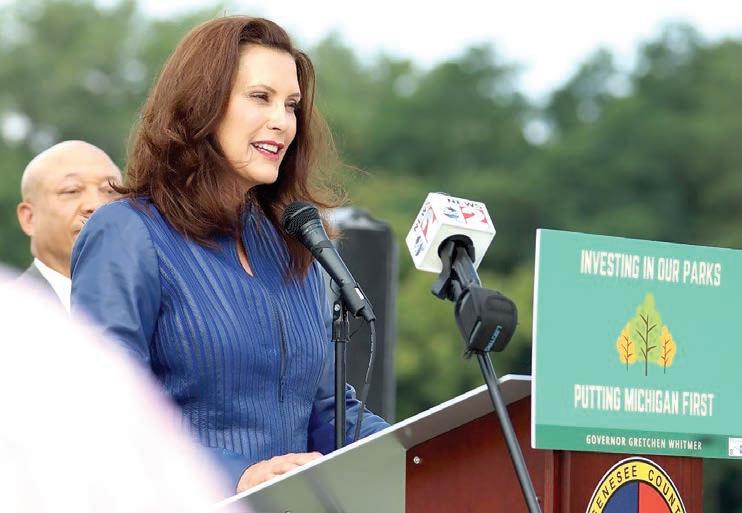
federal commitment to build the Brandon Road lock, helping us invasive carp out of the Great Lakes, protecting tourism and our $7 billion fishing industry. From our Great Lakes to our state parks, Michigan’s outdoors is more than something we enjoy—it’s a gift we must pass on to future generations of Michiganders. Let’s keep working together to invest in Michigan’s outdoors, grow our outdoor economy, and ensure every Michigander—from Inkster to Ironwood—can enjoy our beautiful state.
By Jeremy Allen
EXECUTIVE EDITOR
In a move aimed at directly supporting early-stage entrepreneurs and fueling Detroit’s growing tech economy, city leaders on Monday unveiled the new $700,000 Detroit Startup Fund. Designed to back Detroit-based startups with capital, visibility, and strategic support, the fund represents a public commitment to cultivating innovation— and keeping talent local.
Mayor Mike Duggan, City Council President Mary Sheffield, and officials from the Detroit Economic Growth Corporation (DEGC) announced the initiative at Newlab at Michigan Central, a hub now home to more than 140 startups. Over 200 members of Detroit’s tech and entrepreneurship community attended the launch.
The fund will award 26 grants to startups over the next year, helping entrepreneurs scale products and services with the potential to improve city life, civic operations, and economic opportunity. City officials estimate the program will generate more than $1 million in local economic impact. Applications for the first round opened Monday and will remain open through August 25 at detroitmi. gov/startup.
“Detroit always has been a city of innovators willing to take risk to create something new. The Detroit Startup Fund is one of the ways we are making Detroit the easiest and most supportive city anywhere to start and grow innovative new companies,” said Mayor Mike Duggan. “Because we already have so much talent here in Detroit, the Startup Fund also creates another reason for that talent to stay here and be part of something special.”
The fund will be administered by DEGC, which will select 26 total recipients through two rounds of funding. The program will offer 20 seed grants of $15,000 and six scale grants of $50,000. Thirteen grant recipients will be announced later this year, with a second application window scheduled to open in early 2026.
To be eligible, businesses must be Detroit-based or led by a founder building in Detroit and established within the last 10 years. Applicants must be developing a scalable, venture-backable product or service that has potential civic applications or can improve quality of life for city residents. Businesses must also commit to registering as a Detroit-based business and sharing performance data with the City and DEGC.
For the larger $50,000 grants, companies must also demonstrate that they’ve raised at least $100,000 in outside investment over the past 18 months and have a clear path to raising $250,000. Grant funds can be used for product development, staffing, custom-
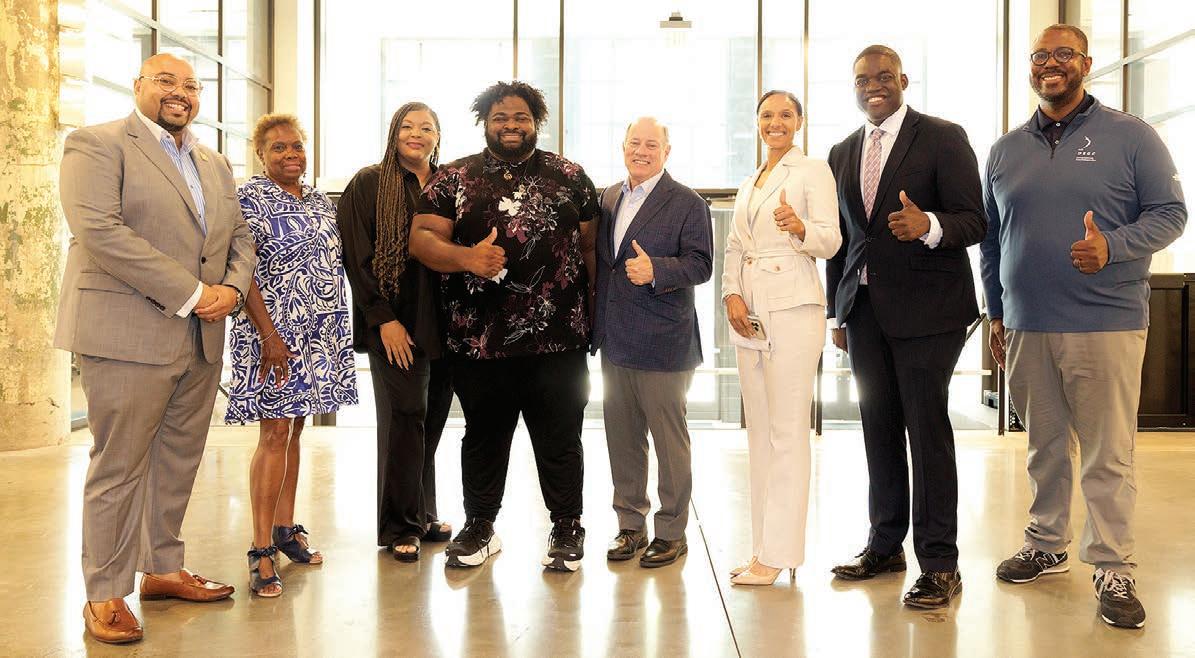
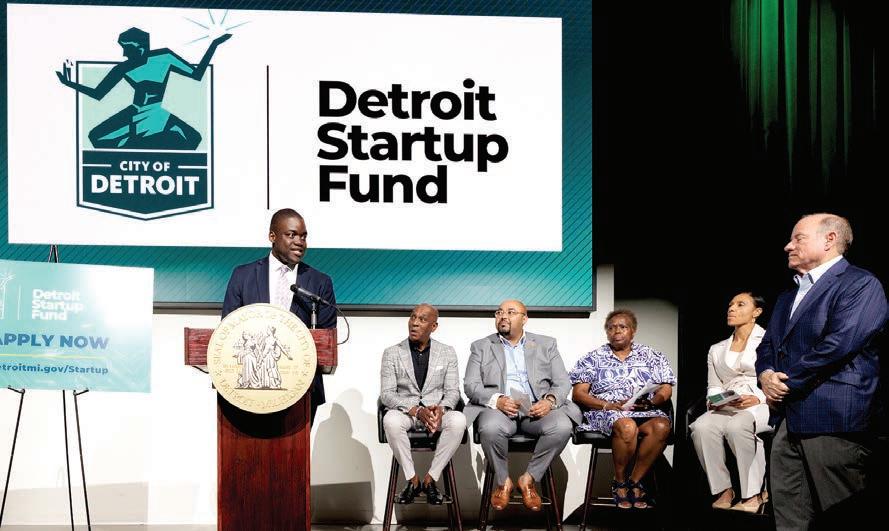
er acquisition, piloting, or other strategic growth efforts.
Detroit’s startup community has gained national traction in recent years. The 2022 Global Startup Ecosystem Report by Startup Genome ranked Detroit as the world’s top emerging startup hub. The report reflects a wave of investment and infrastructure development across the city, from TechTown and Newlab to the new University of Michigan Center for Innovation and a precision medicine campus planned for the former Gratiot jail site.
Still, access to early-stage capital remains a persistent hurdle for startups hoping to grow.
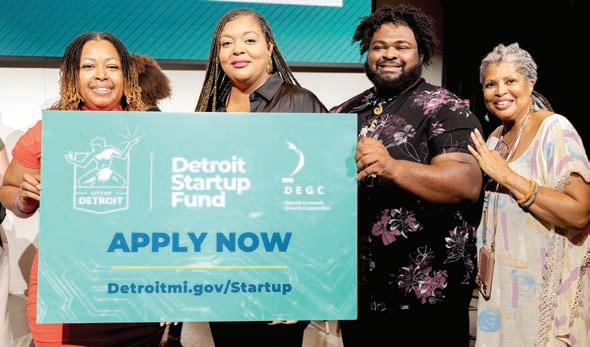
allocated through the City’s general fund, with support from both Mayor Duggan’s administration and the City Council.
“City Council is proud to be a partner in driving tremendous business growth, investment, and opportunity in our city,” said City Council President Mary Sheffield. “This $700,000 investment is a bold step toward creating a more inclusive and equitable economy that centers Detroiters. By opening doors for our entrepreneurs, we are investing directly in the talent, resilience, and creativity of our people. These kinds of resources help grow our population, retain our homegrown talent, and strengthen the local economy. When we invest in Detroiters, we invest in the future of our city.”
Local leaders in the tech and innovation community say the fund offers more than just dollars—it sends a message about who gets to participate in Detroit’s economic future.
“This fund isn’t just about money. It’s about validation and creating pathways for startups that traditional funding sources often overlooked,” said Black Tech Saturdays Co-Founder and Johnnie Turnage. “Detroit and Michigan have incredible talent, but we’ve often lacked the early-stage support that helps startups create jobs. This fund is a monumental step in helping change that.”
The Startup Fund builds on ongoing efforts by the City and DEGC to expand the tech ecosystem and ensure that new economic growth reaches more residents.
“This program will create a rip-
“Detroit has a rich legacy of driving innovation and economic mobility. This fund will give founders the capital and visibility needed to grow and create high-quality jobs right here at home,” said Justin Onwenu, the City of Detroit’s first Director of Entrepreneurship and Economic Opportunity. “By lowering barriers and expanding access, we’re driving economic mobility for years to come.”
ple effect across our local economy,” said Kevin Johnson, President and CEO of the Detroit Economic Growth Corporation. “Every startup that stays in or comes to Detroit because of this new Detroit Startup Fund will drive growth – hiring locally, sourcing from Detroit vendors, and inspiring other entrepreneurs to follow suit.”
Funding for the program was
In addition to the grant program, the city has launched a dedicated startup website to help entrepreneurs navigate resources, access technical assistance, and tap into local accelerators and investor networks. The site also serves as the application portal for the new fund, and applications for Round One are now open through August 25 at detroitmi.gov/startup.

By Jeremy Allen
EXECUTIVE EDITOR
The engines are revving, the vibe is electric, and the mission is crystal clear: drive student success. Gwen Thomas, affectionately known as The Scholarship Mom/Guru, alongside the Board of Directors of Fresh Perspectives College & Career Readiness, are inviting the community to join them for a night of elegance and purpose at the Detroit Dream Cruise Summer Soirée. This high-profile fundraising event, taking place during Dream Cruise weekend, is geared toward supporting Fresh Perspectives’ flagship initiative, the 12th Annual Black Friday Scholarship Bootcamp. Set against the opulent backdrop of BasBlue Mansion in Detroit (110 E Ferry St.), the soirée promises an unforgettable experience. Guests will mingle from 4:00 PM to 7:00 PM amidst a showcase of classic cars, live entertainment, a silent

auction, and mouthwatering food and drinks.
This stylish evening will also feature summer chic fashion, all in support of Fresh Perspectives’ mission to provide scholarships and college readiness programs to students in need.
“This event is more than just a party – it’s about pushing our youth toward success without the burden of college debt,” said Thomas. “We’ve helped students win over $30 million in scholarships, and with federal aid shrinking, our mission is more critical than ever.”
Founded in Detroit, Fresh Perspectives has
See DREAM CRUISE SUMMER SOIRÉE Page B-2

By Jeremy Allen EXECUTIVE EDITOR
On July 24, 2025, Hulk Hogan—born Terry Gene Bollea— died at the age of 71. And with that, millions of us, especially those of us who grew up in the 1980s, found ourselves in the midst of a complicated reckoning. For many, Hogan was more than just a wrestler. He was a cultural icon who defined a generation. Despite being very young at the time, I was a kid in attendance at the Pontiac Silverdome and remember stories from my brothers about the electric atmosphere of WrestleMania III in 1987. The event shattered attendance records with over 93,000 fans in the stands, and there I was, part of that roaring crowd, as Hogan slammed the 500-pound Andre the Giant with an energy that felt like the future itself was being shaped in the ring. It was the peak of the era, a time when Hogan – in his red and yellow – preached a gospel of strength, goodness, and all-American values: “Say your prayers, eat your vitamins, and you’ll never go wrong.”
deeply ingrained racism made us wonder if we were ever really seen by him at all.
The hurt was compounded by the years that followed, as Hogan was quickly reinstated by WWE after his public apology. They erased his name from the Hall of Fame page, then gave it back. They claimed he was a changed man. They said it was time to forgive. But forgiveness doesn’t come just because you say you’re sorry. And it certainly doesn’t come when the apology feels more like a PR move than genuine remorse.
What’s even more difficult to stomach is Hogan’s enthusiastic support for Donald Trump—a man whose policies have alienated, insulted, and hurt so many in Black and marginalized communities. Hogan’s continued endorsement of Trump further distanced him from the very people who had once cheered him on. How could the same man who once embodied “American Hero” now stand behind a man who, for many of us, represented the very worst of what America could be? It felt like another betrayal, like a slap in the face from a childhood hero who should have known better.

But 10 years ago, that image came crashing down, and for many Hulkamaniacs, Hulkamania died then. In 2015, tapes were leaked revealing Hogan’s racist comments during a private conversation that shook the very foundation of his legacy. “I mean, I’d rather if she was going to f--- some n-----, I’d rather have her marry an 8-foot-tall n----worth a hundred million dollars,” Hogan was heard saying, referring to his daughter Brooke’s dating life. “I guess we’re all a little racist. F---ing n-----.” And these were all “Hard R” slurs.
EVENT DETAILS:
Venue: BasBlue Mansion, 110 E Ferry St, Detroit, MI
Date: Sunday, August 17, 2025
Time: 4 – 7 p.m.
Donation:$75 (Tax-deductible)
Theme: Summer Chic
Tickets/Donations: Visit www.freshperspectivesseminars.org
There is no way to sugarcoat it. Those words hit like a steel chair to the back for me and for many Black fans who had once seen him as a hero. I had idolized him as a kid, my imagination racing as I pretended to body slam my friends just like Hogan did to his rivals. And here he was, the same man who had taught us to “train and say our prayers,” spitting out hate that felt like a betrayal.
It was hard to reconcile. How do you go from cheering for someone in front of 93,000 fans to reading words that make you question everything you thought you knew about them?
I’ve spent years wrestling with this inner conflict – the same conflict that millions of Black wrestling fans share. It’s not just that Hogan said something racist. It’s that he was racist, and he was supposed to be something better. He was supposed to represent the strength we wanted to believe in, the hero who stood tall against all comers. But now we were faced with a reality where that larger-than-life persona was just another man. And he was a man whose
By Jeremy Allen
EXECUTIVE EDITOR
The first-ever Lomas Brown Jr. Golf Classic brought together NFL legends, local supporters, and generous sponsors for a cause much greater than a day on the green— raising critical funds for children’s charities across Southeast Michigan. The sold-out event, held at the Country Club of Detroit, raised $268,700 for The Children’s Foundation and the Lomas Brown Jr. Foundation.
Organizers say the success of the event signals not just strong community engagement, but a deep, ongoing commitment to supporting the region’s youth through education, health initiatives, and enrichment programs.
“It was wonderful to have my teammates join me and our community supporters, but the real winners are the young people our two foundations serve,” said Lomas Brown Jr., the former Detroit Lions great and namesake of the new tournament. “These funds will help provide programs that impact countless children and families in southeast Michigan.”
The tournament was present-
ed by Cumulus Media’s WJR AM 760 and sponsored by Ford Motor Company. In many ways, the Lomas Brown Jr. Golf Classic picks up where the Paul W. Smith Golf Classic left off. For over two decades, that event served as a major fundraiser for Detroit-area youth programs. In a nod to that legacy, Brown presented a Legacy Award to Paul W. Smith during WJR’s live broadcast from the club.
NFL Hall of Famers Barry Sanders and Calvin Johnson were among the big names in attendance, joined by a host of Detroit Lions alumni including Herman Moore, Jason Hanson, Stan Edwards, Braylon Edwards, Eddie Murray, Tim Walton, TJ Lang, Larry Lee and Pepper Johnson. The emcee for the evening was Fox2’s Dan Miller, who kept the mood lively and celebratory.
The day included 18 holes of golf at the historic Country Club of Detroit, a cocktail reception, and a fundraising auction. Among the auction’s standout items were three custom golf carts. Two were autographed and branded by Barry Sanders and Calvin Johnson, while the third featured “Sonic & Knuckles”—the nickname for current Lions running backs Jahmyr Gibbs
For some, it would have been easier to just walk away, to dismiss him as a relic of a bygone era. But for me and for many others who were there in Pontiac that day (and for any of us who grew up ripping their t-shirts and pretend-slamming their siblings onto couch cushions), Hogan was more than just an entertainer. He was part of the fabric of our youth. In moments like WrestleMania III, we were all caught up in the fervor of it all, watching the ring light up with the spectacle that only Hogan could bring. In those moments, he was a symbol of everything we thought we could be. Strong. Confident. Unstoppable. But the truth is that sometimes even the strongest among us are hiding dark sides we’d rather not see.
As Hogan’s dark side became public knowledge, I realized that I wasn’t just mourning the loss of Hogan the man. I was mourning the loss of Hogan the ideal. The hero who represented something bigger than life itself had become just another figure trapped in the muck of politics, race, and personal failings. The reality of who he became clashed violently with the dreams he inspired in my youth. He was a reminder that heroes – at least the ones we put on pedestals – are often far more human than we want to believe.
The thing is, this isn’t a story that can be neatly wrapped up with a bow. No amount of public apologies or rebranding could erase the hurt. For many Black fans, it’s hard to forget those words, hard to forgive someone who became a staunch supporter of a man who represents so much


By Ebony JJ Curry SENIOR REPORTER
Detroit has long been a city where rhythm meets resistance, and where stage lights have shined brightest when our young people are at the mic, telling their own stories. On Thursday, August 1, at the historic Music Hall Center for the Performing Arts, that tradition continues with purpose and power as The S.O.N.G. Project (Saving Our Next Generation) presents its annual Youth Theatre Showcase.
Doors open at 6:30 p.m., with a 7:30 p.m. curtain time that promises to deliver more than a performance—it delivers proof. Proof that when young people, especially Black youth, are mentored, invested in, and given the tools to express their truths, they show up ready to lead. They show up transformed.
For three weeks, youth from across the country have gathered right here in Detroit, immersing themselves in a performing arts experience grounded in excellence, discipline, and love. They’ve studied music, dance, acting, piano, and drumline. They’ve rehearsed scenes, written lines, learned harmony and movement. Many entered the program with no prior experience—90% were beginners. But they are walking onto that stage with pride in their posture and purpose in their voice.
At the heart of this initiative is Carles Whitlow, Founder and CEO of The S.O.N.G. Project. A mentor, artist, and visionary who understands that it’s not enough to keep saying “our youth are the future”—you have to build systems that save them now. Whitlow’s model does just that. Through
The S.O.N.G. Project Youth Theatre Showcase
Thursday, August 1, 2025
Music Hall Center for the Performing
structured instruction, social-emotional learning, and real-world guidance, he and his team help students develop not only artistic talent but also confidence, academic motivation, and cultural awareness.
The Youth Theatre Showcase is not about perfection. It’s about process. It’s a culmination of weeks spent pushing through doubt, learning to breathe through stage fright, and discovering strength through art. These young artists aren’t just putting on a show. They are offering a reflection of what’s possible when Black youth are given space to grow in environments that see them as brilliant from the beginning.
Each performance will be original— shaped by the voices, movements, and perspectives of the students themselves. These are not characters borrowed from someone else’s script. These are stories rooted in real life, told through the lens of youth who have spent the summer learning how to honor their voices and each other.
More than just a summer camp, The S.O.N.G. Project is a year-round mentoring program that centers academic and personal growth. Its arts curriculum becomes a tool for developing life skills. Whether it’s through perfecting a monologue, keeping rhythm on a drumline, or holding harmo-
ny in a group vocal, every lesson becomes a way to strengthen focus, discipline, and communication.
And Detroit is the perfect backdrop for this work. The city is home to Motown’s legacy, Broadway-bound talent, and a rich history of performance that continues to shape national narratives. For many of the youth stepping onto the Music Hall stage, this performance marks the first time they’ve seen themselves reflected in a space with that kind of history. It won’t be the last.
Programs like The S.O.N.G. Project serve as reminders that performance isn’t simply about applause—it’s about agency. These youth are not waiting to be discovered. They are discovering themselves, together, through collaboration, mentorship, and the transformative power of the arts.
Detroiters are invited to witness this moment firsthand. To show up. To clap loud. To see what happens when possibility meets preparation. The Youth Theatre Showcase is an invitation—not just to an event, but to a movement.
Because when young people are allowed to dream and equipped to deliver, they don’t just perform—they lead. And Detroit leads with them.
By Ebony JJ Curry SENIOR REPORTER
For generations, Black women have shaped culture with our hair. It’s been a site of power, pride, protest, and presence. But behind the sculpted coils, silk presses, and 30-inch bundles lies a deeper reality—one where beauty comes with labor, cost, and too often, disrespect. Too many Black women know the experience of sitting in a salon chair for hours, only to leave feeling like they paid for more than they received. Not just in dollars, but in dignity.
That experience is familiar to Deja Pryor.

A Detroit native, Pryor grew up watching the women around her care for themselves with limited options and little affirmation. The salon was sacred, but it wasn’t always safe. Beauty stores were stocked with products that didn’t last and stylists who didn’t listen. Customer service often took a back seat to rushed appointments and overbooked chairs. Black women, despite being the largest spenders in the hair care economy, were too often treated like afterthoughts in a market we built.
That disconnect stayed with Pryor. Not as a complaint, but as a calling.
In 2024, she opened Monet Allure Hairline—a luxury beauty brand and salon created with one clear mission: to restore the respect, quality, and care Black women deserve when investing in themselves. She didn’t want to just sell hair. She wanted to build an experience that honored the brilliance of the women she served.
“Monet Allure was built to give women an experience that feels just as luxurious as the hair they’re investing in,” said Pryor. “I’ve always believed that beauty is about more than just the final look—it’s about how you feel while you’re getting there.”
At Monet Allure, the goal is not just to provide premium raw Vietnamese bundles. It’s to reimagine the entire beauty process— from walking in, to being consulted with care, to walking out feeling affirmed and seen. Pryor modeled her service approach after luxury boutiques and high-end car dealerships. The ones where a customer’s time and preferences are treated with in-
tention. Where spending comes with substance.
“We spend hundreds, sometimes thousands, on our hair—just like we do on designer bags or luxury cars,” Pryor said. “But the level of service often doesn’t match the price. I wanted to change that. I built Monet Allure to be a space where women feel like they’re making an investment in themselves, and where the experience is just as beautiful as the hair.”
That level of care is what many Black women have been seeking but rarely find. Not just a style, but a space. A space where no one is rushing them out. A space where their questions aren’t dismissed. A space where luxury is not coded through whiteness, but shaped around their presence.
Pryor believes that excellence should never come at the cost of authenticity. That belief will be front and center on Sunday, August 3, when Monet Allure celebrates its one-year anniversary and product launch with a free community event in Royal Oak. The salon will open its doors to Detroiters, beauty lovers, and influencers for an experience that reflects what the brand stands for—empowerment, service, and connection.
The event will take place from 1:00 to 6:00 p.m. at Monet Allure Salon, located at 25766 Woodward Avenue. Guests can RSVP for free at https://partiful.com/e/ AVel8ypdJo1WIx9ZKAES.
The celebration will include a private luxury shopping experience featuring Monet Allure’s premium raw hair line, a live panel moderated by beauty expert Ask
Jenn, music by Detroit’s own DJ Completd, curated cuisine from local vendors, and an exclusive VIP lounge. Attendees can also enjoy champagne and guided consultations to find the right textures and styles for their needs.
While the experience is elevated, the purpose stays grounded. A portion of proceeds from the event will benefit Alternatives for Girls, a Detroit-based nonprofit that supports young women facing homelessness, abuse, and other life-threatening challenges.
“Partnering with Alternatives for Girls for this event is personal,” Pryor said. “I’ve always had a heart for young women navigating tough situations, and I know firsthand how much it can mean to have someone believe in you when you’re at your lowest. Giving a portion of our proceeds to an organization that provides shelter, resources, and support is just one way we can use this brand to do something bigger than business.”
For Pryor, growth doesn’t mean leaving Detroit behind. It means giving back, on purpose. The salon sits in Royal Oak, but its heartbeat is Detroit. Its roots are in the same streets and salons that shaped her. And the women who walk through her doors now are not just customers—they’re reflections of a culture that has always made something out of nothing.
Pryor’s mission reflects something many Black women have long understood. Hair is not just about vanity. It’s about history. It’s about ownership. And when done right, it becomes a tool for healing, legacy, and freedom.
Monet Allure Hairline offers premium textures and lengths in raw Vietnamese hair, built to last longer and blend better with textured hair. But what Pryor is building goes beyond inventory. She’s building a beauty experience that centers Black women—not as an afterthought, but as the blueprint.
In a time when many beauty spaces still cater to a standard we were never meant to fit, Pryor is carving out something that feels true. Something that welcomes Black women with care and serves them with pride.
Because investing in yourself should never feel like settling.
From page B-1
that we’ve fought against. And it’s even harder to feel like we’re supposed to pay respects to a man who never respected us in return.
And yet, in this moment, with Hogan’s death, I’m left with a strange, conflicted grief. Yes, I’m angry. Yes, I feel betrayed. But I also can’t forget the joy he brought me as a kid or the memories of WrestleMania III and beyond, and the belief that anything was possible. There’s a part of me that still wants to hold onto that little kid who believed in Hulkamania.
I’m allowed to feel conflicted, though. I’m allowed to say that the man I cheered for as a child isn’t a man I can respect as an adult.
Maybe that’s the real struggle, realizing that childhood heroes are often flawed, and sometimes, those flaws are so deep that they can never be truly redeemed. Hogan’s death won’t undo the pain he caused or the tarnished legacy he leaves behind. But it does force us to confront the reality that we are more than the sum of our heroes. We are stronger, wiser, and more aware of the standards we deserve. The man who once embodied the peak of wrestling’s popularity was more hateful than he was heroic, and in the end, that may be the most enduring lesson of all.
To the Black fans who once believed in Hulk Hogan: Your feelings are valid. Your hurt is valid. Your childhood memories are both precious and complicated, and you don’t have to apologize for either. We can keep the memories of our youth without having to mourn the loss of a symbol or deny the truth of the man.
From page B-1
become a nationwide leader in college and career readiness, empowering over 10,000 students to secure scholarships, develop financial literacy, and gain the tools to thrive academically. Through initiatives like the Black Friday Scholarship Bootcamp, Fresh Perspectives has helped students unlock doors to global opportunities with an effort that has never been more needed than now, as traditional funding sources for college continue to dwindle.
“With the rising cost of college and cuts to traditional funding sources, Fresh Perspectives has become a lifeline to many families,” Thomas added. “The Dream Cruise Summer Soirée is your chance to be part of the solution.”
The event is an opportunity to not only enjoy a glamorous evening but to contribute directly to funding scholarships, application coaching, and educational resources for underserved high school seniors in Metro Detroit.
The community is encouraged to attend, sponsor, or simply donate to the cause. All proceeds will directly fund scholarships and educational resources for Metro Detroit students, helping to ensure they graduate with degrees, not debt.
For those interested in media inquiries, sponsorships, or interviews with Gwen Thomas or student beneficiaries, please reach out to Fresh Perspectives.
The goal is to cruise into the future where students graduate with degrees, not debt. and David Montgomery.
From page B-1
Proceeds from the event are set to benefit programs at both nonprofit organizations. The Lomas Brown Jr. Foundation, founded in 1991, focuses on providing post-secondary scholarships and hosting camps that enhance educational, physical, and life skills for young people. The Children’s Foundation will use the funds to support health and wellness initiatives for kids across the region.
At The Children’s Foundation, funds will go toward enabling better treatment, improving health outcomes, and creating more equitable opportunities for Michigan’s youth. “These programs matter now more than ever,” said Andrew Stein, President and CEO of the Foundation. “With the support of events like this one, we can continue to make a long-term impact.”
Additional sponsors supporting the tournament included Gold Sponsor Meijer, Silver Sponsor AISIN World Corp of America, and Bronze Sponsors Delta Airlines, Dow Chemical U.S.A., and Others First.
The second annual Lomas Brown Jr. Golf Classic has already been scheduled for July 13, 2026, and organizers expect it to grow in both participation and impact. Those interested in learning more about the event or the participating foundations can visit www.lomasbrownjrgolf.com.
Through a shared mission of equity, access, and opportunity, both The Children’s Foundation and the Lomas Brown Jr. Foundation are working to create lasting change. And thanks to the success of this inaugural event, thousands more children in Michigan will have the resources they need to thrive.
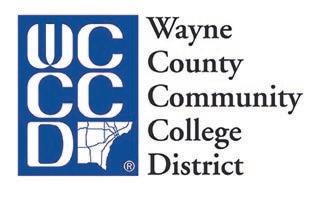
The Detroit Transportation Corporation is seeking Guideway Inspection and Maintenance Services RFP 07.30.2025. Mandatory walk-through August 6, 2025, at 1:00pm. Responses due on August 28, 2025 at 5:00pm RFP can be downloaded from Bidnet Direct http://www.bidnetdirect.com/ detroit-transportation-corporation

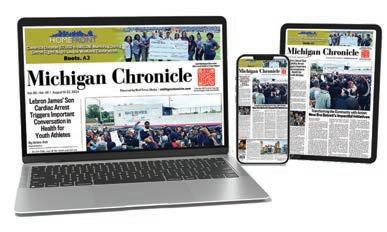




If you’re the one tracking medications, scheduling appointments and making sure the whole household stays healthy, you’re probably wearing the invisible badge of chief household officer – the one who keeps the family healthy and moving forward. Nearly 80% of women serve as their household’s primary health care decisionmaker, managing not just their own care, but also the needs of loved ones.
It’s a big job, and it can come with financial pressure. Research shows women spend almost 30% more out of their own pocket on prescriptions than men, adding up to $8.5 billion more in 2024 alone.
With prices still climbing, it’s important to find ways to stretch your health care dollar further.
That’s why many women are turning to GoodRx – a free, easy-to-use tool that helps you scout out affordable prices on both brand-name and generic medications, compare pharmacy options nearby and make confident choices for your family’s health and wallet. Think of it as your digital saddlebag: stocked and ready with savings, wherever the trail takes you.
As chief household officer, consider these simple, time-saving strategies to help keep everyone on track, spend less on medications, save time and feel more confident managing care:
1. Compare Prices Before Heading to the Pharmacy
Prescription prices can vary dramatically, even between pharmacies just a few blocks apart. These price differences can exceed $100 for the same medication. That’s why you should compare prices
ahead of time at pharmacies near you by entering your prescription information and zip code. Then, simply head to the location offering the most affordable price.
2. Save Big on Generic and BrandName Medications
time SW &HW validation of embedded module ECUs, thru design/production/SW iteration validations. Bachelor, Electrical, Computer, Mechatronics, or Mechanical Engrg. 12 mos exp as Engineer, testing or verifying embedded telematics &infotainment embedded ECUs, using Tc &vSpy tools, or related. Mail resume to Ref#407-1175, GM Global Mobility, 300 Renaissance Center, MC:482-C32-C66, Detroit, MI 48265. Senior Design Sculptor Warren, MI, General Motors. Plan &perform advanced surfacing concepts
Whether you’re treating a simple infection or managing a chronic condition, there are discounts available on thousands of medications, including both generic and brand-name options. You can save up to 80% on generics, and in many cases, find prices online that are even lower than insurance co-pays.
For brand-name medications, GoodRx partners with pharmaceutical manufacturers to offer unique programs where manufacturers offer discount prices for their medications, like insulin Lantus for just $35 or a discounted cash price on Humira biosimilar adalimumab.
These savings extend to care for the four-legged family members, too. For example, pet owners can explore savings and have pet medications delivered right to their door, as well as access petspecific medications that aren’t available in retail pharmacies.
3. Round Up Medications for the Whole Crew in One Place
Whether you’re wrangling care for kids, parents or even the family dog, you can easily keep track of everyone’s needs in one place. Save and manage medications, set reminders to take them on time, get alerts when it’s time for a refill and even earn rewards.
4. Be Your Own Health Hero, Without the High Price
From birth control and menopause treatment to hormone support and fertility medications, women often face higher costs for life’s milestones. Look online for savings on many of the most commonly prescribed medications for women. Some medications, like progesterone for fertility treatment, may be available for as little as $20. Resources like the GoodRx Women’s Health Center feature expert-reviewed information to help you navigate every stage of care, whether you’re managing symptoms, exploring treatment options or planning ahead.
5. Ride Steady with Trusted Health Info at Your Side
The health care landscape can feel like the Wild West at times, but there are tools available to help you ride steady. Beyond prescription savings, expert-written articles can empower you to understand your medications, insurance coverage and care options. Whether you’re gearing up for a doctor’s visit or figuring out the next steps in a new diagnosis, these resources can help you ask the right questions and take the reins on your family’s care.
From everyday refills to high-cost treatments, you can spend less time wrangling medications and more time with the people you love. With savings available at more than 70,000 pharmacies nationwide, GoodRx.com is a must-have tool for every chief household officer riding point on their family’s health.
TUESDAY, AUGUST 5, 2025 POLLS
For the purpose of voting for the following offices:
• Mayor • City Council At-Large
• City Council Districts 2, 5, and 7
If you have any questions regarding your polling location on Election Day, please contact the Detroit Department of Elections at (313) 876-0190. MICHIGAN LAW MANDATES ALL VOTERS TO PRESENT VALID PHOTO ID AT THE POLLS OR COMPLETE AN AFFIDAVIT OF VOTER NOT IN POSSESSION OF PICTURE IDENTIFICATION. Acceptable forms of photo IDs: Michigan Driver’s License or a Michigan Personal ID: Driver’s License or Personal ID by another state; Federal or State Government photo ID; U.S. Passport; Military ID with photo; current Student ID with photo or Tribal ID with photo.
Absentee Ballots are available for all elections. Registered voters may obtain a ballot at the office of the Detroit Department of Elections, the office of the Detroit City Clerk or at any of our Early Voting Centers listed below.
WCCCD Northwest Campus 8200 W. Outer Drive Detroit, MI 48219
Northwest Activities Center 18100 Meyers Rd. Detroit, MI 48235
Farwell Recreation Center 2711 E. Outer Drive Detroit, MI 48234
WCCCD Eastern Campus 5901 Conner St. Detroit, MI 48213
HOURS OF OPERATION:
• Early Vote Centers open on Saturday, July 26, 2025
Department of Elections 2978 W. Grand Blvd. Detroit, MI 48202
City Clerk’s Office (Coleman A. Young Municipal Ctr.) 2 Woodward Ave., Ste. 106 Detroit, MI 48226
Clark Park 1130 Clark St. Detroit, MI 48209
Adams Butzel Recreation Complex 10500 Lyndon Detroit, MI 48238
• Regular business hours: Monday through Friday from 9:00 A.M. to 5:00 P.M.
• Saturday, August 2nd and Sunday, August 3rd from 9:00 A.M. to 5:00 P.M.
• Monday, August 4th – voting ceases at 4:00 P.M.
• Election Day, Tuesday, August 5th from 7:00 A.M. to 8:00 P.M.
Voters may also submit their ballots by dropping it into any of our additional drop boxes (24 hours, 7 days a week) listed below.
Crowell Community Center 16630 Lasher Rd. Detroit, MI 48219
Rouge Park Golf Course 11701 Burt Rd. Detroit, MI 48228
North Rosedale Park Community House 18445 Scarsdale Detroit, MI 48223
Greater Grace Temple 23500 W. Seven Mile Rd. Detroit, MI 48219
Liberty Temple Baptist Church 17188 Greenfield Rd. Detroit, MI 48235
Greater Emmanuel Institutional COGIC 19190 Schaefer Hwy. Detroit, MI 48235
Tindal Recreation Center 10301 W. Seven Mile Rd. Detroit, MI 48221
Palmer Park Community Center 1121 Merrill Plaisance St. Detroit, MI 48203
Perfecting Church 7616 E. Nevada Detroit, MI 48234
Faith Temple 19000 Conant Detroit, MI 48234
Greater St. Paul 15325 Gratiot Ave. Detroit, MI 48205
Heilmann Recreation Center 19601 Crusade Detroit, MI 48205
Balduck Park 5271 Canyon Detroit, MI 48236
Considine Center 8904 Woodward Ave. Detroit, MI 48202
Greater Christ Baptist Church 3544 Iroquois Ave. Detroit, MI 48214
Horatio Williams Foundation 1010 Antietam Ave. Detroit, MI 48207
Renaissance Baptist Church 1045 E. Grand Blvd. Detroit, MI 48207
Butzel Family Center 7737 Kercheval Detroit, MI 48214


Detroit Pistons Performance Center 690 Amsterdam St. Detroit, MI 48202
WCCCD Downtown Campus 1001 W. Fort St. Detroit, MI 48226
Unity Baptist Church 7500 Tireman Detroit, MI 48204
Kemeny Recreation Center 2260 S. Fort St. Detroit, MI 48217
Davison Service Yard 8221 W. Davison Detroit, MI 48238
William S. Ford Memorial Church 16400 W. Warren Detroit, MI 48228
Christ Temple Baptist Church 10628 Plymouth Rd. Detroit, MI 48204
Edison Library 18400 Joy Rd. Detroit, MI 48228
Use your Smartphone’s camera to scan this QR Code for more access! Be sure to sign up for updates.
